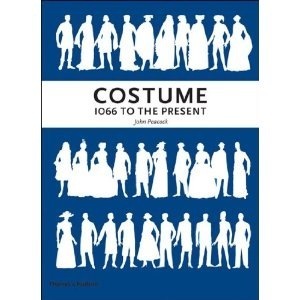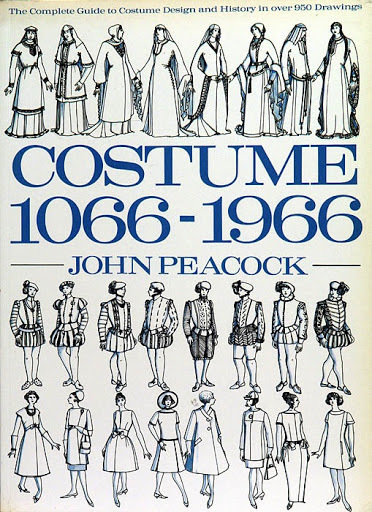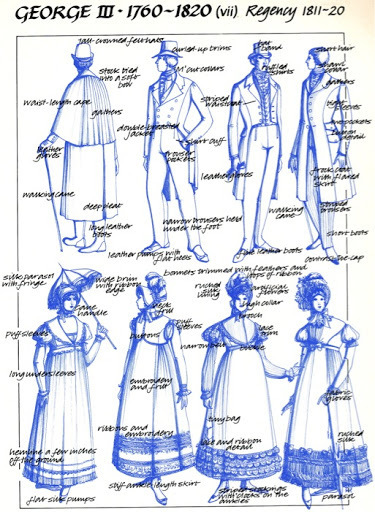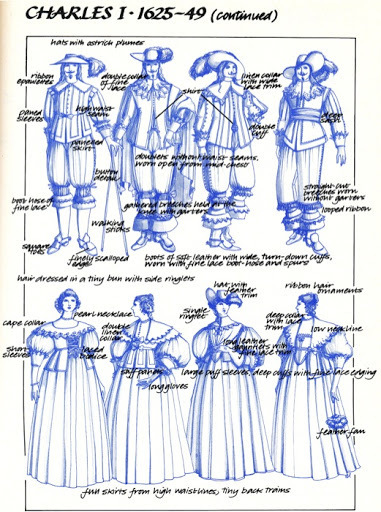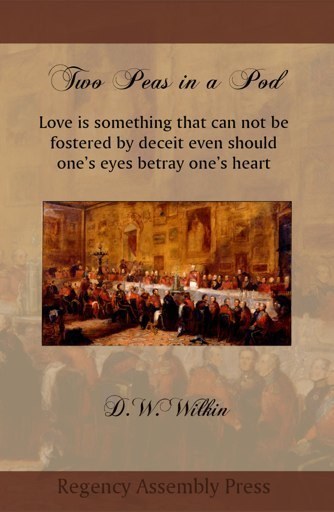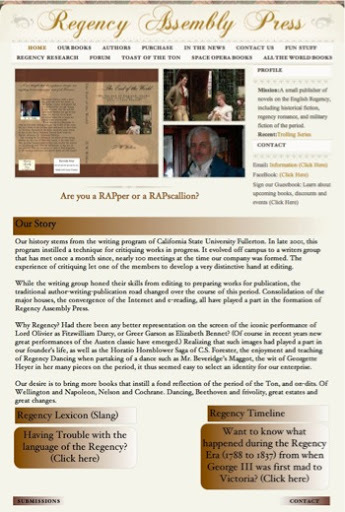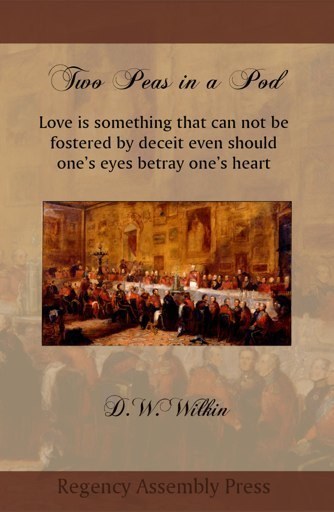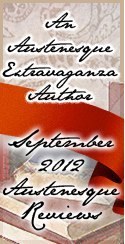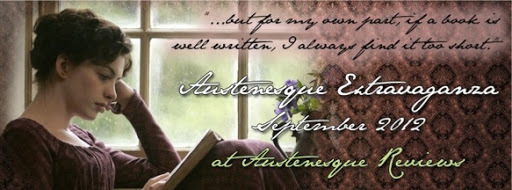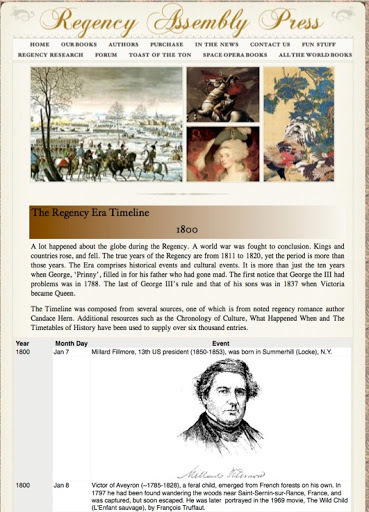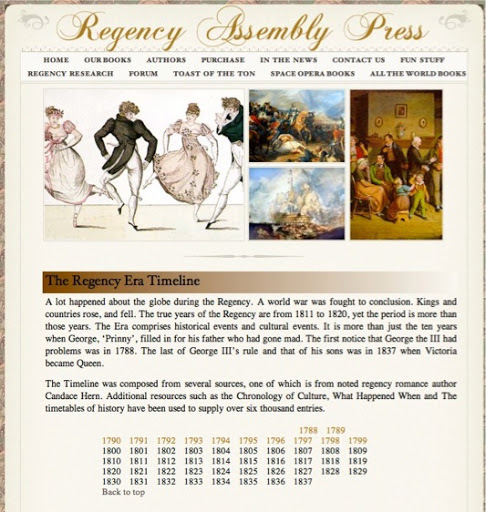D.W. Wilkin's Blog, page 345
August 15, 2012
A Regency Era Timeline 1803 in progress
Timeline
Each time I start a year, I have already compiled a list, months ago with about 6000 entered of what happened from 1788 to 1837. My first step now (It took several trials to get this down to a science) is to cut out the specific year I will work on and paste it into its own spreadsheet to work with. When I worked on the entire spreadsheet, sometimes inserting a line, with all the graphics I had begun to place, took a long time. Working on each year alone, is a lot faster.
With the year separated out, I now turn to my book sources,
The Timetables of History by Grun and Stein
Chronology of CULTURE by Paxton and Fairfield
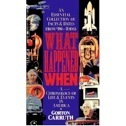 What Happened When by Carruth.
What Happened When by Carruth.
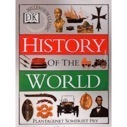 , History of the World. A beautiful Dorling Kindersley book.
, History of the World. A beautiful Dorling Kindersley book.
I now and diligently look through each of these to find entries that I did not come across on the internet, and other printed lists. It is possible that there are places that have more listings for each year. I have not found them. And when you go to the Timelines at the Regency Assembly Press page, there you will see all the graphical references as well. Something that I did not find anywhere else.
Here is the start of 1803:
Year
Month Day
Event
1803
Jan 11
Monroe and Livingston sailed for Paris to buy New Orleans; they ended up buying Louisiana. [see Dec 20, 1802]
1803
Jan
Lord Elgin concluded his diplomatic mission to Constantinople.
1803
January
January: The first edition of the British fashion magazine Le Miroir de la Mode is published by the famous modiste, Madame Lanchester. Read more about her here on this site.
1803
January
January: William Cobbett begins publishing Parliamentary Debates, an unofficial record of Parliamentary proceedings.
1803
Feb 2
Albert Sidney Johnston, Genl. (Confederate Army), was born. He died in 1862 at Shiloh.
1803
Feb 14
An apple parer was patented by Moses Coats in Downington, Penn.
1803
Feb 15
John Augustus Sutter (d.1880), Swiss-US colonist (New Helvetia, Ca., Sutter Mill), was born.
1803
Feb 19
Congress voted to accept Ohio’s borders and constitution. However, Congress did not get around to formally ratifying Ohio statehood until 1953.
1803
Feb 21
The British return the Cape of Good Hope to the Dutch (Batavian Republic) under the Treaty of Amiens.
1803
Feb 21
Edward Despard became the last person drawn & quartered in England.
1803
Feb 24
The Supreme Court ruled itself the final interpreter of constitutional issues. Chief Justice John Marshall, by refusing to rule on the case of Marbury vs. Madison, asserted the authority of the judicial branch. The US Supreme Court 1st ruled a law unconstitutional (Marbury v Madison).
1803
Feb 25
The 1,800 sovereign German states united into 60 states.
1803
Mar 1
Ohio became the 17th state.
1803
Mar 3
The first impeachment trial of a U.S. Judge, John Pickering, began.
1803
Mar 14
Friedrich Gottlieb Klopstock (78), German poet, died.
1803
Mar 19
Johann von Schiller’s “Die Braut von Messina,” premiered in Weimar.
1803
Apr 5
1st performance of Beethoven’s 2nd Symphony in D.
1803
Apr 7
Francois D. Toussaint L’Ouverture (Louverture), Haitian revolutionary, died in a dungeon at Fort Joux in the French Alps. In 2007 Madison Smartt Bell authored “Toussaint Louverture: A Biography.”
1803
Apr 26
Villagers of L’Aigle, France, witnessed a meteor shower. The rocks helped to convince scientists that meteors were of extraterrestrial origin.
1803
Apr 30
The US under Thomas Jefferson signed a treaty that accepted the purchase of the Louisiana Territory from Napoleon Bonaparte’s government of France for 60 million francs or about $15 mil. The area included most of the thirteen states that lie between the Mississippi River and the Rocky Mountains. American envoys sent to France were originally instructed to buy only the port city of New Orleans and were astonished when Napoleon, abandoning plans for an American empire, offered them all of Louisiana. The United States doubled in size through the Louisiana Purchase. The federal government spent less than $8 million in operations and borrowed the money needed for the purchase.
1803
April
April: Beethoven premiers his Second Symphony (Symphony No. 2. in D major, Opus.36) in Vienna.
1803
May 7
Johan Peter Cronhamm, composer, was born.
1803
May 16
Great Britain and France renewed their war.
1803
May 17
John Hawkins and Richard French patented a reaping machine.
1803
May 18
Great Britain declared war on France after General Napoleon Bonaparte continued interfering in Italy and Switzerland.
1803
May 22
The 1st US public library opened in Connecticut.
1803
May 23
Lord Elgin and his family were detained in Paris. Elgin’s family was allowed to proceed but he was arrested and declared a prisoner of war.
1803
May 24
Charles LJL Bonaparte, Corsican, French prince of Canino, Musignano, was born.
1803
May 25
Ralph Waldo Emerson (d.1882), American essayist and philosopher, was born. A biography of Emerson that includes information about his friends was written in 1996 by Carlos Baker and titled: “Emerson Among the Eccentrics: A Group Portrait.” It includes such people as: the transcendental visionary Bronson Alcott, essayist Henry David Thoreau, mad poet Jones Very, activist Margaret Fuller, poet Ellery Channing. Other people included are Hawthorne, Melville, Theodore Parker, and the family of Henry James. “Money often costs too much.” “Nothing astonishes men so much as common sense and plain dealing.”
1803
May
May: Britian declares war on France, dissolving the short-lived Peace of Amiens.
1803
May
May: France begins to assemble a fleet at Boulogne in preparation for an invasion of England.
1803
May
May: Napoleon abandons plans to expand his empire into North America when it becomes clear that French possessions on that continent had become indefensible. He needs money to finance a renewed war with Britain that is looming, and sells all the French territories to the United States in the Louisiana Purchase.
1803
Jul 8
Frederick Augustus Hervey (b.1730), the 4th Earl of Bristol and Bishop of Derry, died. He had toured Europe with his own cook and entourage and inspired a number of hotels to take on the Bristol name.
1803
Jul 23
Irish patriots throughout the country rebelled against Union with Great Britain. Robert Emmett led the insurrection in Dublin.
1803
Jul 31
John Ericsson, inventor of the screw propeller, was born.
1803
July
July: Robert Emmet leads an unsuccessful uprising in Ireland, and is later executed.
1803
Aug 31
The government-sponsored transcontinental expedition under the leadership of Captain Meriwether Lewis and Lieutenant William Clark set off down the Ohio River. The 40-member expedition wintered and trained near St. Louis before starting up the Missouri River in three boats on May 14, 1804. Lewis and Clark’s three-year journey of exploration and discovery to the Pacific Coast and back stimulated western settlement and proved that an overland route to the West Coast was possible.
1803
August
August: Lewis and Clark embark on their transcontinental expedition to the Pacific coast of North America.
1803
Sep 5
Francois Devienne, composer, died at 44.
1803
Sep 8
A high pressure steam boiler, made by Richard Trevithick, exploded at a corn mill in Greenwich, England, and 3 men were killed. A worker had left a heavy wrench on the safety valve and gone fishing.
1803
Sep 13
Commodore John Barry, considered by many the father of the American Navy, died in Philadelphia.
1803
Sep 17
Franz Xaver Sussmayr, composer, died.
1803
Sep 20
Robert Emmet, Irish nationalist, was executed.
1803
Sep 23
British Major General Sir Arthur Wellesley defeated the Marathas at Assaye, India.
1803
Sep 27
Samuel Francis DuPont (d.1865), Rear Admiral (Union Navy), was born.
1803
Sep 28
Prosper Merimee, playwright (Carmen), was born in Paris, France.
1803
September
September: At the Battle of Assaye in India, British-led troops under the command of Arthur Wellesley defeat Maratha forces.
1803
Oct 2
Samuel Adams (b.1722), former Gov. of Mass. (1793-1797), died. He was a propagandist, political figure, revolutionary patriot and statesman who helped to organize the Boston Tea Party. In 2008 Ira Stoll authored “Samuel Adams: A Life.”
1803
Oct 3
John Gorrie, inventor of the cold-air process of refrigeration, was born.
1803
Oct 20
The US Senate voted to ratify Jefferson’s Louisiana Purchase.
1803
Oct 31
Congress ratified the purchase of the entire Louisiana area in North America, which added territory to the United States for 13 subsequent states.
1803
Oct
The USS Philadelphia was captured by the Tripolitans. 307 sailors were held for ransom by the Pasha of Tripoli.
1803
October
October: British scientist John Dalton presents his atomic theory for the first time, in which he proposes that matter is composed of discrete units called atoms.
1803
Nov 3
Henri Moreau, composer (75), died.
1803
Nov 5
Chalderon de Laclos, writer, died.
1803
Nov 18
The Battle of Vertieres was fought. Jean-Jacques Dessalines (b.1758), Haitian rebel leader, led his army to decisive victory over the French with his slogan “Cut off their heads and burn down their houses.”
1803
Nov 29
Christian Doppler (d.1853), Austrian physicist who discovered the Doppler effect, was born. Hubble used his name for the Doppler Effect, that describes the apparent change in the frequency of a wave depending on whether the wave is approaching or receding.
1803
Nov 30
Spain, in a ceremony at New Orleans, completed the process of ceding Louisiana to France, which had sold it to the United States.
1803
November
November: French writer Choderlos de Laclos, author of Les Liaisons Dangereuses (Dangerous Liaisons), dies at age 62 while campaigning as a general for Napoleon.
1803
Dec 3
Hector Berlioz, French composer (Symphony Fantastique), was born. [see Dec 11]
1803
Dec 11
Hector Berlioz (d.1869), French composer and conductor, was born. He introduced arresting and gaudy instrumental colors in combinations that had not been dreamed of before him. He composed “Romeo and Juliet” in 1939 and conducted its first performance. He also composed the “Death of Cleopatra.” He composed “Symphonie Fantastique” and “La Damnation de Faust.” [see Dec 3]
1803
Dec 20
The Louisiana Purchase was completed as the territory was formally transferred from France to the United States during ceremonies in New Orleans. French Prefect Pierre Clement Laussat, US Gov. William CC Claiborne and US Gen. James Wilkinson signed 4 copies the treaty. The Louisiana Purchase effectively doubled the size of the existing U.S. With 827,987 square miles in the deal, that price translates to roughly $18 per square mile- under 3 cents/acre.
1803
Dec 23
Lt. Stephen Decatur, commanding the schooner Enterprise, captured a Barbary ketch, which was entered into the US Navy as the Intrepid.
1803
December
December: The Mughal emperor Shah Alam II comes under British protection.
1803
1803
Construction begins in Scotland on a 60.5-mile Caledonian Canal to connect the Atlantic with the North Sea across northern Scotland.
1803
John Constable exhibits for the first time at the Royal Academy.
1803
John Philip Kemble leaves Drury Lane and becomes manager of the Theatre Royal, Covent Garden. His sister, Sarah Siddons, follows him to Covent Garden, where she will perform until her retirement in 1812.
1803
Matthew Flinders completes the first circumnavigation of Terra Australis.
1803
Napoleon revokes the French assembly’s emancipation decree of 1794, declaring his intention to reintroduce slavery in Hispaniola and other French territorial possessions.
1803
Spanish painter Francisco de Goya paints The Clothed Maja, a picture of the same woman in the same pose as The Nude Maja, painted around 1800, but this time fully dressed. In 1815 the Spanish government confiscates both paintings, calling them obscene, and strips Goya of his position as Court painter.
1803
The Nude Maja, c1800. The Clothed Maja, 1803 by Francisco de Goya. The second painting was created after general outrage in Spanish society over the first painting (primarily because it showed pubic hair). Without a pretense to allegorical or mythological meaning, The Nude Maja has been called “the first totally profane life-size female nude in Western art”.
1803
Thomas Sheraton publishes The Cabinet Dictionary, a compendium of instructions on the techniques of cabinet and chair making.
1803-1822
Caledonian Ship Canal cuts clear across Scotland via the Great Glen.
1803
Ohio becomes the 17th U.S. state. (Mar 1)
1803
President Jefferson and others support an investment of $15 million for the Louisiana Territory, which Napoleon is willing to sell for cash for his war efforts.
1803
Toussaint L’Ouverture dies in prison. (Apr 7)
1803
The treaty between Britain and France has broken down. Again they go to war against each other. (May 18)
1803
A German makes morphine from opium. Physicians are delighted that opium has been tamed. Morphine is lauded for its reliability and safety.
1803
In England, seven Irish rebels are the last sentenced to be hanged, drawn and quartered. In deference to public opinion the sentence is commuted to merely hanging and beheading.
1803
Irish are rebelling against British rule. They are crushed militarily by the British, but unrest among the Irish will remain in Ireland through the rest of the century.
1803
The Wahhabis do not view the Shia as Muslims. A Shia assassinates the conqueror Abdul Aziz of the House of Saud.
1803
Jean Baptist Say penned “A Treatise on Political Economy,” in which he said that management is a factor of production.
1803
Thomas Robert Malthus (1766-1834), English political economist, authored the 2nd edition of his 1798 “An Essay on the Principle of Population.” This edition introduced the idea of moral restraint.
1803
Beethoven composed his “Kreutzer Sonata” dedicated to the French violinist Rudolphe Kreutzer.
1803
One of the architects of the U.S. Capitol, Benjamin Henry Latrobe, who succeeded William Thornton and Stephen Hallet as Capitol architect in 1803, modified the original design of the Capitol and used Greek inspiration in the details. Latrobe was chiefly responsible for introducing the Greek Revival in the U.S. His Bank of Pennsylvania building in Philadelphia was the first Greek building in the country and was characteristic of his free adaptation of ancient precedent and vaulted construction.
1803
The US Mint struck its last silver dollars until 1934, when special 1804 silver dollars were minted as gifts from left over dies.
1803
Dewitt Clinton (1769-1828) began serving his 1st term as Mayor of New York City and continued to 1807. His 2nd term as mayor was from 1808-1810 and again from 1811-1815.
1803
In NYC the industrial district surrounded the Collect Pond. It got so polluted that the Common Council called for it to be filled and the process was begun in this year.
1803
John Dalton, British chemist and physicist, pointed out that the fact that chemical compounds always combined in certain proportions could be explained by the grouping together of atoms to form units called molecules.
1803
The steel ink pen was developed in Birmingham, England.
1803
The French Academy of Sciences insisted that meteorites could not exist because no specimens had been produced.
1803
Alexander Von Humboldt, German explorer and scientist, spent some time in Taxco, Mexico. The house where he stayed later became the Museum of Colonial Religious Art.
1803
Denmark became the first country to ban slave trade.
1803-1812
Lord Elgin organized the removal of sculptures from the Parthenon.
1803-1815
In 2007 Charles Esdaile covered this period in his book: “Napoleon’s Wars: An International History, 1803-1815.”
1803-1862
Barend Cornelis Koekkoek of Holland came from a renowned family of artists. He considered the painting of nature the only true calling of an artist.
1803-1876
Orestes Augustus Brownson, American author and clergyman was born in Stockbridge, Vt. At first a Presbyterian, he later became a Universalist, a Unitarian minister, head of his own church, a transcendentalist, and finally (1844) a Roman Catholic. As a writer and magazine editor, Brownson dealt with religious questions and fought social injustice: “We have heard enough of the liberties and the rights of man, it is high time to hear something of the duties of men and the rights of authority.” In 1992 Gregory Butler wrote the biography: “In Search of the American Spirit,” and in 1999 R.A. Herrera published “Orestes Brownson: Sign of Contradiction.”


August 14, 2012
A Regency Era Timeline 1802 in progress
Timeline
Each time I start a year, I have already compiled a list, months ago with about 6000 entered of what happened from 1788 to 1837. My first step now (It took several trials to get this down to a science) is to cut out the specific year I will work on and paste it into its own spreadsheet to work with. When I worked on the entire spreadsheet, sometimes inserting a line, with all the graphics I had begun to place, took a long time. Working on each year alone, is a lot faster.
With the year separated out, I now turn to my book sources,
The Timetables of History by Grun and Stein
Chronology of CULTURE by Paxton and Fairfield
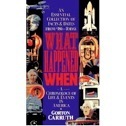 What Happened When by Carruth.
What Happened When by Carruth.
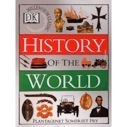 , History of the World. A beautiful Dorling Kindersley book.
, History of the World. A beautiful Dorling Kindersley book.
I now and diligently look through each of these to find entries that I did not come across on the internet, and other printed lists. It is possible that there are places that have more listings for each year. I have not found them. And when you go to the Timelines at the Regency Assembly Press page, there you will see all the graphical references as well. Something that I did not find anywhere else.
Here is the start of 1802:
1802
1802
Year
Month Day
Event
1802
Jan 25
Napoleon was elected president of Italian (Cisalpine) Republic.
1802
Jan 26
Congress passed an act calling for a library to be established within the U.S. Capitol.
1802
Jan 29
John Beckley of Virginia was appointed 1st Librarian of Congress.
1802
Jan
In London, England, William Cobbett (1763-1835) set up the Weekly Political Register. It spread dissent during the post-war recession.
1802
Feb 4
Mark Hopkins, US educator, philosopher (Williams College), was born.
1802
Feb 8
Simon Willard patented a banjo clock.
1802
Feb 23
Dewitt Clinton (1769-1828) began serving as US Senator from New York and continued to 1803.
1802
Feb 26
Victor Hugo (d.1885), French novelist and poet, was born in Besancon. In 1998 Graham Robb published the biography: “Victor Hugo.” “Initiative is doing the right thing without being told.”
1802
Feb
Napoleon sent a large army under his brother-in-law, Charles Leclerc, to regain control of St. Domingue. Thousands of soldiers died mainly to yellow fever and French control was abandoned so as to support military ventures in Europe. Toussaint L’Ouverture (Louverture) turned to guerrilla warfare inspired by the ideals of the French Revolution and its motto of “Liberty, Equality, Fraternity.”
1802
February
February: The Rosetta Stone, having been taken from the French as part of the spoils of war in Egypt, arrives in London and is presented to the Society of Antiquaries. A few months later, it is given to the British Museum.
1802
Mar 16
The US Congress authorized the establishment of the US Military Academy at West Point, N.Y. President Jefferson signed a measure authorizing the establishment of the US Military Academy at West Point, N.Y.
1802
Mar 24
Richard Trevithick was granted a patent in London for his steam locomotive.
1802
Mar 27
Treaty of Amiens was signed. The French Revolutionary War ended.
1802
March
March: the Peace of Amiens, the final peace treaty with France, is signed.
1802
Apr 4
Dorothea Dix, American proponent of treatment of mental inmates, was born.
1802
Apr 8
French Protestant church became state-supported and controlled.
1802
Apr 19
Spain reopened the New Orleans port to American merchants.
1802
Apr 27
Abraham Louis Niedermeyer, composer, was born.
1802
April
April: A general amnesty is signed by Napoleon allowing all but about one thousand of the most notorious émigrés of the French Revolution to return to France.
1802
April
April: Parliament repeals the British income tax of 1799 and orders that all documents and records relating to the tax be destroyed in response to public outcry.
1802
May 3
Washington, D.C., was incorporated as a city, with the mayor appointed by the president and the council elected by property owners.
1802
May 15
Isaac Ridgeway Trimble (d.1888), Major General (Confederate Army), was born.
1802
May 18
Great Britain declared war on Napoleon’s France.
1802
May 19
provided that anyone admitted swore to uphold liberty and equality.
1802
May
May: Napoleon establishes the Légion d’Honneur or Ordre National de la Légion d’Honneur as a reward to commend civilians and soldiers. (All orders of the kingdom had been abolished during the French Revolution.) The Order remains the highest decoration in France.
1802
May
In Saint-Domingue (later Haiti) Gen. Toussaint L’Ouverture surrendered to French forces. Many of his generals continued to wage a guerilla campaign against the French.
1802
Jul 4
The United State Military Academy opened its doors at West Point, New York, welcoming the first 10 cadets.
1802
Jul 7
The first comic book was published in Hudson, NY. “The Wasp” was created by Robert Rusticoat.
1802
Jul 8
Gen. Toussaint L’Ouverture of Saint-Domingue (later Haiti) was sent to France in chains.
1802
Jul 9
Thomas Davenport, invented 1st commercial electric motor, was born.
1802
Jul 24
Alexandre Dumas (d.1870), French novelist and dramatist who wrote “The Count of Monte Cristo” and “The Three Musketeers,” was born. Alexandre Dumas, pere, French author of romantic plays and novels. He wrote “The Man in the Iron Mask.” He was the father of Alexandre Dumas fils (1824-1895), French author of plays of social realism.
1802
Aug 2
Napoleon Bonaparte was proclaimed “Consul for Life” by the French Senate after a plebiscite from the French people.
1802
Aug 5
Niels Henrik Abel (d.1829), mathematician, was born in Frindoe, Norway.
1802
Aug 7
Napoleon ordered the re-instatement of slavery on St. Domingue (Haiti).
1802
Aug 25
Toussaint L’Ouverture (Louverture) was imprisoned in Fort de Joux, Jura, France.
1802
Aug 31
Captain Meriwether Lewis left Pittsburgh to meet up with Captain William Clark and begin their trek to the Pacific Ocean.
1802
August
August: Napoleon is declared First Consul for life in a new French constitution, and is given the right to name his successor.
1802
Sep 4
A French aeronaut dropped eight-thousand feet equipped with a parachute.
1802
Sep 11
Piedmont, Italy, was annexed by France.
1802
Sep 19
Louis Kossuth (d.1894), later president of Hungary, was born. “The instinctive feeling of a great people is often wiser than its wisest men.”
1802
Oct 10
The 1st non-Indian settlement in Oklahoma was made.
1802
Oct 22
Samuel Arnold (62), English composer, died.
1802
Oct 28
The 34-gun Spanish frigate Juno, enroute back to Spain from Mexico [Puerto Rico], ran into a storm off the coast of Virginia. Captain Don Juan Ignacio Bustillo perished along with 425 men, women and children and an estimated half-billion dollars in treasure. A boy from the wreck survived on Assateague Island and was named James Alone. He later changed his name to James Lunn. Many Chincoteague islanders later traced their descent to James.
1802
Oct 31
Benoit Fourneyron, inventor of the water turbine, was born.
1802
October
October: The Edinburgh Review begins publication.
1802
October
October: The French army enters Switzerland.
1802
Nov 9
Elijah P. Lovejoy, American newspaper publisher and abolitionist, was born.
1802
November
November: British painter George Romney dies at age 67.
1802
November
November: British watercolorist Thomas Girtin dies at age 27. His early death prompts J.M.W. Turner to remark: “Had Tom Girtin lived, I should have starved.”
1802
Dec 20
The United States bought the Louisiana territory from France. [see Jan 11, 1803]
1802
December
December: Madame Tussaud arrives in London and exhibits her wax figures for the first time in England at the Lyceum Theater. From 1803 to 1835, she tours throughout England with her exhibition. In 1835 the exhibiton finally gets a permanent home on Baker Street in London.
1802
Henry Holland converts York House on Piccadilly (for ten years a residence of the Duke of York) into the Albany apartments, 69 sets of rooms for bachelors.
1802
Sculptor Antonio Canova’s Perseus With the Head of Medusa is so admired that it is placed in one of the stanze of the Vatican hitherto reserved for the most precious works of antiquity.
1802
The Factories Act (sometimes called the “Health and Morals of Apprentices Act”) is passed, regulating factory conditions, especially in regard to child workers in cotton and woollen mills.
1802
The first practical steamboat towed two barges along the Forth and Clyde Canal.
1802
The Rosetta Stone. The Ptolemaic stela includes three translations of a single passage: in hieroglyphics, Demotic, and Greek. It was ultimately the key to understanding the previously undecipherable ancient hieroglyphic language. French scholar Jean-François Champollion is credited with the first translation in 1822. The stone has been on display at the British Museum since 1802.
1802
The second volume of Joanna Baillie’s Plays of the Passions is published under her name.
1802
William Cobbett begins publishing the Political Regsiter, a weekly newspaper.
1802
The Ottoman Turks, trying to maintain empire, are fighting the Saud family and its Sunni Wahhabi allies. In Mesopotamia the Wahhabis capture the Shiite holy city of Karbala. In Arabia they capture Mecca.
1802
Leader of Haitian independence, Toussaint L’Ouverture, receives a message from the French General Brunet to meet for negotiations. Brunet assures Toussaint that he will be perfectly safe with the French, whom he says are gentlemen. When Toussaint shows up for the meeting, the French take and ship him to France, to a prison near the Swiss border.
1802
The war-weary British sign a treaty ending their war against France — The Treaty of Amiens.
1802
James Gillnay painted “Cow-Pock,” a satirization of the new cowpox vaccination to prevent smallpox.
1802
Nathaniel Bowditch (1773-1838) published “The New American Practical Navigator,” later known as the “seaman’s bible.” It was a revision of his 1799 and 1800 works, which in turn revised the 1722 work of John Hamilton Moore.
1802
John Playfair published a more readable volume of Hutton’s Theory of the Earth as Illustrations of the Huttonian Theory of the Earth.
1802
James Callender, an English-born journalist, published a report in the Richmond, Va., Recorder about Thomas Jefferson and his relationship with the slave Sally Hemmings [Hemings]. In 1997 Annette Gordon-Reed published: “Thomas Jefferson and Sally Hemmings, an American Controversy.” DNA tests of descendants in 1998 indicated that Jefferson fathered at least one child with Hemmings, her youngest son Eston Hemmings in 1808. Dr. Eugene Foster, author of the DNA report, later said the DNA tests showed that any one of 8 Jefferson males could have fathered Eston. In 2008 Annette Gordon-Reed authored “The Hemmingses of Monticello: An American Family.”
1802
Beethoven composed the 6 Gellert songs of Op. 48.
1802
Congress repealed all taxes except for a tax on salt and left the government dependent on import tariffs.
1802
Andrew Jackson was elected to command the Tennessee militia.
1802
Eleuthere Irenee du Pont de Nemours (d.1834), a French immigrant, set up a saltpeter mill in Wilmington, Del., on the banks of the Brandywine River. In 8 years it grew to become America’s largest black-powder plant as it supplied gunpowder to the US for the War of 1812.
1802
Joseph Ellicott, New York Quaker surveyor, founded Genessee County and the town of Batavia: “God made Buffalo, I will try and make Batavia.”
1802
Heinrich Olbers, German astronomer, discovered an asteroid orbiting between Mars and Jupiter, He believed it to be a planet and named it Pallas after Pallas Athena (goddess of wisdom and war).
1802
Edward Howard, English chemist, determined that the iron in meteorites was a unique blend of iron and nickel that did not occur in known terrestrial rocks.
1802
An American captain of the ship Palmyra blew ashore on a southern atoll 1,052 miles south of Hawaii and named it Palmyra after his ship.
1802
Harriot Wilson was publicly executed by the state of Pennsylvania for the murder of her infant child. An account of the “exploits of the murderess” is published in 1822 by J. Wilkey.
1802
In Australia the Aboriginal warrior Pemulwuy (b.~1750) was shot dead. His head was cut off and believed to have been placed in a jar and sent to England. He opposed British settlement and was described by Sydney’s then governor Philip King as “a terrible pest to the colony” but also “a brave and independent character.”
1802
Britain levied the first English income tax to raise money to fight Napoleon. William Pit the Younger 1st introduced the income tax to finance the war against France.
1802
England passed its first law regulating child labor.
1802
A British exploring party led by Matthew Flinders landed on a 96-mile-long island southwest of Adelaide and slaughtered 31 kangaroos for a feast. This 3rd largest island off Australia was thus named Kangaroo Island. Flinders named the Great Barrier Reef and found a passage to the Corral Sea.
1802
The Rosetta Stone was seized by the British in Egypt after the defeat of Napoleon’s army and was sent to England.
1802
The Rome stock exchange was founded. The Borsa di Roma occupied the site of a temple completed in 145 AD as a tribute to Emperor Hadrian.
1802
In Vietnam Hue was founded as the royal capital of the Nguyen dynasty that united Vietnam. Palaces, tombs and monuments were located along the banks of the Perfume River.
1802-1803
George Friedrich Grotefend published his account of translating cuneiform script.
1802-1828
Richard Parkes, English watercolorist.
1802-1838
Letitia Landon, English poet: “Few, save the poor, feel for the poor.”
1802-1876
Harriet Martineau, English writer and social critic: “Religion is a temper, not a pursuit.”
1802-1880
Lydia Maria Child, American author Thought for Today: “It is right noble to fight with wickedness and wrong; the mistake is in supposing that spiritual evil can be overcome by physical means.”
1802-1889
Juana Briones Y Tapia de Miranda was born in Santa Cruz, Ca. She was a battered wife and became the first California woman to get a divorce. She was the first to settle on Powell St. in what is now North Beach, SF. In 1989 the Women’s Heritage Museum persuaded the state to authorize a plaque in her honor to be set in Washington Square.


August 12, 2012
A Regency Era resource John Peacock’s Costume 1066 to 1966
One of the most useful resources I have as a writer when describing English Fashion from past days is the seminal book of images on the subject, John Peacock’s Costume 1066 to 1966. As the OED is for the words we use and to see to their historical accuracy, for me Peacock is the same for clothing that was worn. There may be areas were the time is off a little, and I am not a fashion historian. This though is my first resource (I have several others) and I would think that unless I am called on to give my own lecture about costume, it is amongst the best.
WW Norton’s bio for Peacock is: John Peacock was Senior Costume Designer for BBC Television for many years. His many books include The Complete Fashion Sourcebook; Costume: 1066 to the Present; The Chronicle of Western Costume; Twentieth-Century Fashion; Fashion Since 1900; Fashion Accessories; Shoes; Men’s Fashion; Twentieth-Century Jewelry; and many others.
From my copy of his book I have John Peacock has worked as a fashion designer, lecturer in fashion history and as a costume designer for theater, film and television. He is currently senior costume designer for BBC Television.
I came across Peacock first when I joined a group of reenactors that focused on 1066 to 1600, well over half the coverage of the book. The Society for Creative Anachronism had many such women and men wanting to make their garb at events to be as factual, with modern fabrics (not polyester) as they could be. Few want to wear heavy woolens in sunny Southern California and 90+ degree summers. Thus now when I say, time to go get my Peacock I am not referring to my feathers, (I’m a guy, so I get the pretty ones…) but to this invaluable resource. The question as you will see from the illustrations, if you don’t have it as a reader, or a writer, is why not?
The Uses
I find that it has served me well twice. Once as a reenactor for it has all these ideas for your costume. And then it served Cheryl, my wife, the same for her wedding outfit as well as ball gown for some of the eras of time we have gone to dance in. The second service is as I mentioned here, as a writer. I can look at the pictures and then match up what to describe what it being worn. I can also see where something may be out of period.
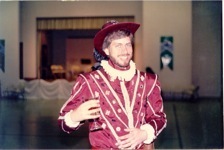
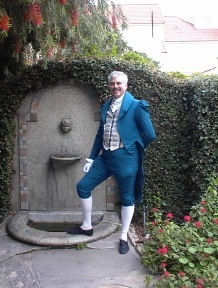
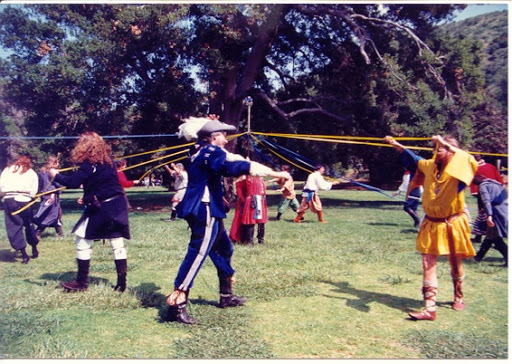
I’m in the Cavalier
The Book
The cover of my Copy from the late 1980’s
A portrait came to light a few days back in our writing and Regency discussions that I thought the gown was from later, when the picture was actually painted. I of course turned to Peacock to look it up. For some Regency outfits and gowns, here is the later part of Prinny’s regency clothing. As you can see Peacock does sketches and then labels what the elements are.
And from the pictures I placed in this post of me in garb inspired by Peacock, we have the end of Charles I and the English Civil War (I need to read some good novels on that period, the Cavalier period and ECW if anyone can recommend them.) This may be my favorite fashion period of all time, for now men do look like Peacocks themselves.


Regency Era Thoughts on Free Lending services
A couple days ago this was my post at the bottom of where I reported on 4 things. But I had so little feedback and continue to see writers (not authors) of blogs who post on the unfairness of it all, that I decided to give my thoughts more precedence. The writers with no skin in the game are complaining that this one service was brought down. A service that benefited 15,000 members. Maybe all of those members were not pirates, but it then depends on how you define piracy. If these members, once they discovered that having bought one book, never had to buy another and could go to the site and get books for free, then they were piratical. The writers never see that side of things in their blog posts. They continue to harp that authors abused the process to bring the site down.
That though is not the case. They notified the creator, who may have been too sick to respond quick enough, but the loop hole by which these members who were not friends with each could abuse it showed that the site was a road prone to piracy of copyright work and that is something that the Internet self polices. Here taking the site down is one thing that the Internet did right.
Notes on LendInk, and the free lending of eBooks
I have another friend who found on Facebook that some one in Canada was giving out her books for free. That just does not seem right and with a great deal of effort, Facebook took the site down. Facebook is slow to admit that their system allows the creating of illegal and bogus material of any sort, since of course all you have to do is click a few buttons and type what you want about anything.
I hope all my readers know that I am selling the Brooklyn Bridge for $1400 dollars US if you send it to my Paypal account here…
But seriously, the question of copyright comes up. And then there is LendInk which may have started as a good idea, but it is a corruptible idea surely through no fault of the founder, but of many of the users. The last few days I have seen posts by relatively intelligent writers who have of course, no skin in the game, saying that it is a travesty that LendInk has been put to bed.
That is not so, and I will explain me (Like Ricky in I Love Lucy)
In the days when a book was a book. You may remember it, it was not but a very few years ago. You would pay your $7.99 or whatever and read the book. You had one copy, and then you would have a friend, someone you knew, someone you had talked to more than once for 3.87 seconds. And so you knew what books they might like as well.
Well, you being done with a book, you would offer to lend them a book, or even, should you be rich enough in soul and pocket, give them the book.
I think all authors (and I know I take on a lot when I include all authors) are quite fine with such a model. Then we have LendInk (and other sharing services. I name LendInk since there is a great deal of Internet bits and bytes about it right now), and while the concept may seem alright, I think again most authors have a problem with it. (See I switched things there a little) And that is what LendInk does/did.
They used the idea that we authors had given our okay to lend out the eBooks because, well Amazon made it a condition of offering the book at a reasonable price to readers. So we really had NO CHOICE. Did I say that loud enough for all involved in the controversy. Let me say it again. AMAZON GAVE US NO CHOICE if we were to sell a book to you so that a reader could afford it. Want to sell a book for below $10.00 then you have to allow it to be leant for free.
But then we all believe that you still can lend one of our books that you purchase to your friends. Your friends. People you know for more than 3.87 seconds. People who are really your friends and not those who follow you on Twitter, or friended you meaninglessly on Facebook just to make your little circle bigger.
Quibbling over the definition of friend in the “Social Network” age is meaningless for just as people do know what is good and what is not good, readers will know what a friend is.
So an anonymous site were you let people you have never met know that you bought 5 books for your Kindle and thus can now lend them. You can then borrow from people you have never met, 5 books that you do not have to pay for, and that the author who spent hundreds of hours writing will not get paid for. That is the fallacy of LendInk and similar services. It takes the lending to a friend out of lending and does indeed make this as piracy. A reader only has to have 1 book purchased and then they can put that up to lend and borrow again without ever buying another book.
Is that fair? Whatever business you are in, is that fair? Would these bloggers, presumably being paid through advertising on their blogs like it if the advertisers got together and compared notes and said, that since they placed one ad, they now had the right to swap their ad from site A to the bloggers site, with the person who had bought ads on the bloggers site, and then never pay again? Of course not. But the bloggers who are defending the now defunct site don’t care if a writer gets no money and won’t be able to eat. The blogger will get money and be able to eat and eat more since they can get free reading material at pirating sites. LendInk may not have started out that way, but it is easily abused that way.
But lest you think I am heartless and should deny you reading literature, even great literature, for if the free bottom feeders can’t even afford $.99 for a great many books, they can often get books for free each and every day around the net that authors are giving away. But there is Project Gutenberg that had scores of volunteers who typed word by word the original manuscripts of out of copyright MASTERPIECES and CLASSICS. They have so many books available for free, that a newborn living to a hundred would die before finishing that FREE library.


August 11, 2012
A Regency Era Timeline 1801 in progress
Timeline
Each time I start a year, I have already compiled a list, months ago with about 6000 entered of what happened from 1788 to 1837. My first step now (It took several trials to get this down to a science) is to cut out the specific year I will work on and paste it into its own spreadsheet to work with. When I worked on the entire spreadsheet, sometimes inserting a line, with all the graphics I had begun to place, took a long time. Working on each year alone, is a lot faster.
With the year separated out, I now turn to my book sources,
The Timetables of History by Grun and Stein
Chronology of CULTURE by Paxton and Fairfield
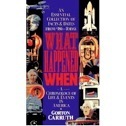 What Happened When by Carruth.
What Happened When by Carruth.
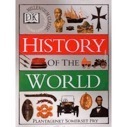 , History of the World. A beautiful Dorling Kindersley book.
, History of the World. A beautiful Dorling Kindersley book.
I now and diligently look through each of these to find entries that I did not come across on the internet, and other printed lists. It is possible that there are places that have more listings for each year. I have not found them. And when you go to the Timelines at the Regency Assembly Press page, there you will see all the graphical references as well. Something that I did not find anywhere else.
Here is the start of 1801:
Year
Month Day
Event
1801
Jan 1
Giuseppi Piazzi (d.1826), Italian astronomer, discovered an asteroid orbiting between Mars and Jupiter. He believed it to be a planet and named it Ceres (goddess of the harvest).
1801
Jan 11
Domenico Cimarosa (51), Italian composer (Matrimonio segreto), died.
1801
Jan 20
US Secretary of State John Marshall was nominated by President Adams to be chief justice. He was sworn in on Feb. 4, 1801. Marshall effectively created the legal framework within which free markets in goods and services could establish themselves.
1801
Jan 28
Francis Barber (ca. 1735 – 1801), the Jamaican manservant of Samuel Johnson (1752-1784), died at the Staffordshire General Infirmary.
1801
Jan
Toussaint Louverture, ignoring the commands of Napoleon Bonaparte, overran Spanish Santo Domingo, where slavery persisted.
1801
January
January: Emma Hamilton gives birth to the illegitimate daughter of Lord Nelson.
1801
January
January: the Act of Union with Ireland creates the United Kingdom.
1801
Feb 4
John Marshall was sworn in as chief justice of the United States.
1801
Feb 7
John Rylands, merchant, philanthropist, was born in England.
1801
Feb 17
The House of Representatives broke an electoral tie between Thomas Jefferson and Aaron Burr, electing Jefferson president. Burr became vice president. When George Washington announced that he would retire from office, he set the stage for the nation’s first two-party presidential campaign.
1801
Feb 17
Thomas Jefferson won the White House vowing to get rid of all federal taxes. He was supported by a new coalition of anti-Federalists that was the ancestor of the Democratic Party. In 2003 Jules Witcover authored “Party of the People: A History of the Democrats.”
1801
Feb 21
John Henry Newman, was born. He was the Protestant vicar who converted to Catholicism and became a Roman Catholic Cardinal. He authored “Dream of Gerontius.”
1801
Feb 27
The District of Columbia was placed under the jurisdiction of Congress.
1801
Feb 28
Motiejus Valancius, Lithuanian educator, historian, writer and bishop, was born in Nasrenai in the Kretinga region. He died May 29, 1875, in Kaunas. His portrait is on the 2-litas note.
1801
February
February: The government of William Pitt collapses over the issue of Catholic emancipation. Pitt had made veiled promises of emancipation in order to secure the Act of Union, but George III would not support it, and Pitt resigned.
1801
February
February: The Treaty of Lunéville, between France and the Holy Roman Empire, is signed, giving France control up to the Rhine and the French client republics in Italy and the Netherlands. Britian is now the sole nation fighting against France.
1801
14-Mar
Prime Minister of Great Britain: Henry Addington, 1st Viscount Sidmouth
1801
Mar 3
1st US Jewish Governor, David Emanuel, took office in Georgia.
1801
Mar 4
Thomas Jefferson became the first President to be inaugurated in Washington, D.C. (1801-1809). James Madison became secretary of state. In his inaugural address Jefferson said: “Though the will of the majority is in all cases to prevail, that will, to be rightful, must be reasonable; the minority possesses their equal right, which equal laws must protect, and to violate would be oppression.”
1801
Mar 10
Britain conducted its first census in order to find out how many men were available for conscription.
1801
Mar 11
Paul I (46), Czar of Russia (1796-1801), was strangled in his bedroom in St. Petersburg ending 4 years of insane rule. His son Alexander I Pavlovich (23) succeeded him.
1801
Mar 14
Christian Friedrich Penzel (63), composer, died.
1801
Mar 21
Andrea Lucchesi (59), composer, died.
1801
Mar 24
Aleksandr P. Romanov became emperor of Russia.
1801
Mar 25
Anthony Ziesenis (69), architect, sculptor (Camper), died.
1801
March
March: England conducts its first census.
1801
March
March: Henry Addington becomes Prime Minister.
1801
March
March: The London Stock Exchange is founded.
1801
March
March: Thomas Jefferson becomes the third President of the United States.
1801
March
March: Tsar Paul I of Russia is assassinated. He is succedded by Tsar Alexander I.
1801
Apr 2
The British navy defeated the Danish at the Battle of Copenhagen.
1801
Apr 8
Soldiers rioted in Bucharest and killed 128 Jews.
1801
Apr 11
Johann von Schiller’s “Die Jungfrau von Orleans (The Maid of Orleans),” premieres in Leipzig.
1801
Apr 12
Josef Franz Karl Lanner, Austrian composer, violist, was born.
1801
Apr 21
Saudi Arabs led Sunni raids into Karbala, Iraq, killing about 5,000 people.
1801
Apr 24
The 1st performance of Joseph Haydn’s oratorio “Die Jahreszeiten (The Seasons).”
1801
Apr 28
Anthony Ashley-Cooper, the seventh Earl of Shaftesbury and a leading social reformer of the Victorian Age, was born in England. Shaftesbury labored to establish schools, to abolish the use of small children as chimney sweeps, and to wipe out child prostitution. He was a vocal opponent of slavery but had little respect for the United States’ President Abraham Lincoln and thought the South should be permitted to secede from the Union.
1801
April
April: At the Battle of Copenhagen, Lord Nelson deals a death blow to the League of Armed Neutrality (Russia, Denmark, Sweden, and Prussia) with his destruction of the Danish fleet. When he returns to England in June, he is elevated to a viscount.
1801
April
April: The U.S. Library of Congress is founded.
1801
May 6
British Lt. Thomas Cochrane, commander of the 14-gun sloop HMS Speedy, engaged and captured the 32-gun Spanish frigate El Gamo. The climactic battle in Patrick O’Brian’s novel “Master and Commander” is based on the Speedy’s fight with El Gamo. Cochrane was later elected to Parliament, pointed out corruption and was arrested on trumped up charges. After that he served as the first commander of Chile’s navy, then Brazil’s navy and the Greek navy before returning to England. In 2000 Robert Harvey authored “Cochrane: The Life and Exploits of a Fighting Captain.”
1801
May 14
The Pasha of Tripoli symbolically declared war on the US by cutting down the glagstaff in front of the US Consulate, after learning that Pres. Jefferson had refused to pay a renewed tribute of $225,000.
1801
May 16
William Henry Seward was born. He was later Gov. of New York and the American Sec. of State from 1861-1869. Under Pres. Lincoln he purchased Alaska for the United States at 2 cents per acre.
1801
Jun 1
Mormon leader Brigham Young (d.1877), the second president of the Mormon Church, was born in Whitingham, Vt.
1801
Jun 10
The North African state of Tripoli declared war on the United States in a dispute over safe passage of merchant vessels through the Mediterranean. Tripoli declared war on the U.S. for refusing to pay tribute.
1801
Jun 14
Former American Revolutionary War General Benedict Arnold died in London.
1801
Jun 29
Frederic Bastiat (d.1850), French free-market economist, was born in Bayonne. “The state is the great fictitious entity in which everyone seeks to live at the expense of everyone else.”
1801
June
June: Cairo falls to British troops.
1801
Jul 3
Johann Nepomuk Went (56), composer, died.
1801
Jul 5
David G. Farragut (d.1870), American naval hero, was born in Knoxville, Tenn.
1801
Jul 7
A new constitution, drafted by a committee appointed by Toussaint Louverture (L’Ouverture), went into effect and declared the independence of Hispaniola. The constitution made him governor general for life with near absolute powers.
1801
Jul 16
Pope Pius VII and 1st consul Napoleon signed a concord.
1801
Jul 17
The U.S. fleet arrived in Tripoli after Pasha Yusuf Karamanli declared war for being refused tribute.
1801
Aug 1
The American schooner Enterprise captured the Barbary cruiser Tripoli.
1801
Aug 6
A 9-day revival began at the Cane Ridge Presbyterian Church in Bourbon County, Kentucky. Some 20,000 people showed up for the revival called by Rev. Barton W. Stone. 3 evangelistic Christian groups grew out of the meeting.
1801
August
August: The West India Docks open after a two-year design and construction project by William Jessop. Built on the Isle of Dogs, they are the first large wet docks built in the Port of London, and can accommodate 600 ships.
1801
Oct 6
Napoleon Bonaparte imposed a new constitution on Holland.
1801
Oct 23
Gustav Albert Lortzing, composer, was born.
1801
Oct 23
Johann Gottlieb Naumann (60), German composer, died.
1801
October
October: The Treaty of London is signed, a preliminary peace treaty ending the war between France and Britain.
1801
Nov 3
Karl Baedeker (d.1859), German publisher, was born. He became well known for travel guides. His 1835 “Travel on the Rhine” is widely considered as the 1st modern guidebook.
1801
Nov 3
Vincenzo Bellini, Italian opera composer (La Sonnambula, Norma), was born.
1801
Nov 9
Carl Philipp Stamitz, composer, died.
1801
Nov 9
Gail Borden (d.1874), inventor of condensed milk, was born in New York.
1801
Nov 10
Samuel Gridley Howe (d.1876), educator of the blind, was born. He was the husband of Julia Ward Howe, author of the “Battle Hymn of the Republic.”
1801
Nov 10
Kentucky banned dueling.
1801
Nov 16
The 1st edition of New York Evening Post was published. Alexander Hamilton helped found the paper and served as editor.
1801
Dec 24
Richard Trevithick, inventor of the steam locomotive, completed a road test of his 1st “traveling engine” in Camborne, England.
1801
December
December: Richard Trevithick builds and demonstrates the first steam-powered road locomotive.
1801
Another Act of Union joins the Kingdom of Ireland to England and Scotland, and the Union Flag sees the addition of the diagonal red cross.
1801
Architects Charles Percier and Pierre-François-Léonard Fontaine publish the Recueil de décorations intérieures, a compilation of drawings of contemporary design that will set the standard for the Empire style of interior decoration that spreads throughout Europe.
1801
Beethoven completes the “Moonlight Sonata” (Piano Sonata No. 14 in C-sharp minor, Opus 27).
1801
English horse racing at Goodwood is introduced by Charles Lennox, Duke of Richmond.
1801
Lord Elgin, with permission of the Turkish government that controls Athens, begins the removal of sculptured portions of the Parthenon, a task that takes five years to complete.
1801
Maria Edgeworth’s Belinda is publlished.
1801
The first census is held.
1801
The Union Jack becomes the new flag of the United Kingdom in 1801, incorporating the Cross of St. George (England), the Cross of St. Andrew (Scotland), and the Cross of St. Patrick (Ireland).
1801
Robert Trevithick demonstrates a steam locomotive.
1801
Britain is rising as an industrial power. The average life expectancy is around 40. A fictional “better-off” family will be described as drinking water that has a cow taste because it is taken from a brook from which cows drink. Meat is rare. Dental care is poor. The family eats with wooden spoons. Candles are rarely used because they cost too much. The father “visited the city once, but the travel cost him a week’s wages… The children sleep two to a bed on straw mattresses on the floor.”
1801
Britain makes Ireland part of a single British kingdom. Parliament in Dublin is abolished. The Anglican Church is to be recognized as the official church in Ireland. No Catholics are to be allowed to hold public office.
1801
Napoleon of France has defeated Austria. In the treaty of Lunéville, Austria renounces claims to the Holy Roman Empire.
1801
Rembrandt Peale painted his brother’s portrait: “Rubens Peale with Geranium.”
1801
Francois Rene de Chateaubriand (1768-1848), French writer, authored his novel “Atala” following a trip to the US.
1801
Samuel Taylor Coleridge, English poet, wrote to Sir Humphrey Davy a letter in which he says: “I seem to sink in upon myself in a ruin, like a Column of Sand, informed and animated only by a Whirl-Blast of the Dessert.” Coleridge had become addicted to opium in this year.
1801
Beethoven composed Op. 25 Serenade for flute, Violin and Viola.
1801
Thomas Bruce, the 7th Earl of Elgin, took the 2,500 year-old bas-reliefs from the Parthenon while he served as the British ambassador to the Ottoman Empire. 17 figures and 56 panels were put on display at the British Museum in 1816. Around 1939 the marbles were subjected to a botched scouring operation that damaged 40% of the collection. Elgin had hired Giovanni Lusieri, an Italian artist from the court of the King of Naples, to oversee the Parthenon project.
1801
Thomas Jefferson began a set of proper rules for the Senate when he wrote: ” No one is to disturb another in his speech by hissing, coughing, spitting, speaking, or whispering to another.”
1801
Elder John Leland, a Baptist minister, helped commission a 1,235-pound wheel of Cheshire cheese as a gift of gratitude for Thomas Jefferson’s steadfast support of religious liberties.
1801
The London Stock Exchange formed. British government debt was the only security traded and this remained so until 1822.
1801
French artist Girodet depicted Ossian, the mythical 3rd century blind Scottish poet, before the story was exposed as a fraud.
1801
In France Napoleon opened the Louvre to the public.
1801
Napoleon’s army in Egypt surrendered to Turkish and English forces. The French civilian toll topped 25 of 150, while the military toll topped 25,000 over the 3-year expedition.
1801
Friedrich von Hardenberg (b.1772), German poet (Novalis), died. He was later known as the father of German romantic nationalism.
1801
In Mexico La Iglesia de Nuestra Senora del Refugio was a Franciscan-style mission church built in the border town of Guerrero Viejo.
1801
South Ossetia was absorbed into the Russian Empire along with Georgia.
1801-1806
Alexandre Dumas (d.1870) covered these years of French history in an 1869 serialized novel printed in the journal, “The Universal Monitor.” In the 1980s Claude Schopp, a retired French lecturer, discovered the epic novel on microfilm. He got it published under the title “Le Chevalier de Sainte-Hermine,” and in 2005 it became a top ten seller.
1801-1835
John Marshall (1755-1835) was chief justice of the US Supreme Court. In 1996 Charles F. Hobson wrote “The Great Chief Justice: John Marshall and the Law” and Jean Edward Smith wrote “John Marshall: Definer of a Nation.”
1801-1848
Thomas Cole, English born US painter. He and Asher B. Durand became fathers of the Hudson River School of painting and founded the National Academy of Design.
1801-1864
Caroline Matilda Stansbury Kirkland, American author: “Like other spurious things, fastidiousness is often inconsistent with itself, the coarsest things are done, and the cruelest things said by the most fastidious people.”
1801-1866
Jane Welsh Carlyle, English writer: “In spite of the honestest efforts to annihilate my ‘I-ity,’ or merge it in what the world doubtless considers my better half (historian Thomas Carlyle), I still find myself a self-subsisting and alas! self-seeking ME.”
1801-1921
A single Parliament legislated all the British Isles. A history of the archipelago was written in 2000 by Norman Davies: “The Isles.”
2 Peas in a Pod Excerpt
I continue with more of Chapter One for the new book to be released in the next few weeks: Two Peas in a Pod  .
.
Two brothers that were so close in appearance that only a handful have ever been able to tell them apart. The Earl of Kent, Percival Francis Michael Coldwell is only older than his brother, Peregrine Maxim Frederick Coldwell by 17 minutes. They may have looked as each other, but that masked how they were truthfully quite opposite to one another.
For Percy, his personality was one that he was quite comfortable with and more than happy to let Perry be of a serious nature. At least until he met Veronica Hamilton, the daughter of the Baron Hamilton of Leith. She was only interested in a man who was serious.
Once more, Peregrine is obliged to help his older brother by taking his place, that the Earl may woo the young lady who has captured his heart. That is, until there is one who captures Peregrine’s heart too.
Chapter 1 Continued
Finally out of his camp seat, Percival checked to make sure he had his own coat on. They had once been playing their little trick on the Countess, their mother while growing up and made the mistake of not checking. It had gone terribly wrong after that. Raising the tent flap, he called for a runner, and then sent the man to fetch a doctor. After such a day, though, there were not many available. Peregrine, had to take his poorly bandaged self to a doctor. Where he was turned over to an assistant to have his wound cleaned, sewn, and bandaged.
Percival went to attend his own men, something that Peregrine had been urging, Not only as a brother giving advice, but as a superior officer telling his subordinate what to do. Percival often chose to ignore orders from Peregrine, when he thought that he could. He was the elder, and the Earl.
Peregrine had been reminded of that enough when little things stood between them. Percival had not thought to play that particular card when it was something of importance. Not as yet. Peregrine had no illusions that one day his brother would go too far and make an issue of his titled rank. That would be a bad day for the brothers. They may not have been dissimilar in appearance, but they certainly were most dissimilar in spirit.
Wellington, some few days later had summoned Peregrine to his quarters, once they had moved the force back to somewhere quieter. Battlefields were no place to have encampments. Peregrine knew that Napoleon had once again been thrown from power and was even then having his disposition decided. Probably not back to Elba. He had been apprehended, or had turned himself over. News was not exact in the army. “Recovered well?” Wellington asked. Peregrine had to have the arm in a sling for a week. Colonel Askew was all concerned how he had gotten wounded, when during the fighting he did not remember his second coming under attack.
“Yes, sir. Thank you.”
“Good. I will not mince words with you. I should desire that you refrain from this game of yours in my presence in future. You are more valuable to me then as a commander of a company. Askew goes home and you will be Colonel for the nonce until you return. I have many company commanders and if your brother needed a moment to find such courage, give him a swift kick next time. I do not have enough men to command my battalions and regiments. I will say, though, that when I need something done, I but yell for Coldwell and have more than I needed done, even if I do not know which one you are.” The Duke smiled.
“Sorry sir. I won’t let it happen again,” Peregrine said.
“I expect you will. I will talk to the Earl also, for what you do with others mostly does not concern me. I do not expect we shall have another fight. But it is time to put such actions aside, don’t you think?” Peregrine nodded. He did, but Percival would have been an ill choice to lead the troops that day. Even though he had done well on others.
“Yes sir. I agree. If Napoleon is truly caught, won’t we all be going home soon?”
A forced laugh came out, “I had thought that the fighting was done once before. We shall see. If we do go home, what of you? Are you planning to remain a soldier?”
Peregrine said, “I think I will resign my commission, sir. I have had much of soldiering, and think I should do better elsewhere.”
“Yes, you are the one who did graduate University, and your brother will be happy, no doubt, to sit in Lords and sleep the day away.”
Peregrine smiled in response to the Duke’s observation. Wellington was being funny with a small amount of truth to it. “I expect you are correct, your grace.”
“Out of here. Call me that in London, but not in my camp.” The Duke look irritated but he dismissed Peregrine readily enough. Peregrine really had not thought about the future beyond thanking the creator that the war was over. That it had seemed over. He did not like the chance of dying, nor of killing over much. No, he was not fond of that part of it all. He did like living after the battle. And Peregrine knew that directing where men should be was a skill he had. But it was a skill no man should excel at. Being a very good butcher of other men was not something to be very proud of.
* * *
Percival thought that London hadn’t changed. He had left the army ahead of Peregrine and the carriage was taking him to Coldwell House, the home he now owned on Bedford Square. He would stay in Town for a few weeks before he left for the country and see to the estate.
That was a euphemism for him that meant to do nothing. He had a man of business that saw to such things. He had a factor that ran the estate, and had done so while he was off fighting. The manor in Chartham, Kent Park, was the largest for miles around, and close enough to Canterbury that there was some civilization nearby. One long day of travel from Town, or two should he want to make his way at a leisurely pace. He was going to choose the latter. He looked forward to seeing the estate and doing nothing. A great deal of nothing. He would have to put up with his sister Penelope, but she was so young, that she would not be a bother.
Percival shook his head even as the arrived in Bedford Square. Penelope was supposed to be of an age and leave the schoolroom that season. He was sure Peregrine had mentioned it. Perry had a head for such twaddle. She could not be a woman grown. Percival distinctly remembered her as a spindly little child. It had been four years since they had seen one another, but surely she would not have grown overmuch.
Four years ago he was the same size, in height at least. He might have gained a stone or near two, since then. The fourth Company’s mess never lacked for good victuals. Well sometimes it did, but when well supplied, they had the best of many things that other companies and regiments did not. He was a Grenadier Guard Captain. He had to maintain a certain level of style, also as Earl people expected him to be of a certain status. Percival was sure that even Wellington was envious of the table that he could lay.
Upstart India robber was new come to his wealth and so didn’t appreciate the finer things. He would, but Percival was the ninth Earl and had a certain level of decorum to maintain. Arriving at the house, he found the butler awaiting him. The man and the entire staff, though many were new as the house had only a caretaker while he was on the continent. “Ah, Williams, everything seen to? You were able to come and put all to rights?”
“Yes my lord. We have been able to hire all the staff that Coldwell House requires per your instructions…”
“Hmm, do you still have those. Perry wrote them and I just glanced at them, having so much to do to prepare to leave France when I was told I could leave. I suppose it would be well if I reviewed them fully. Cook…” Percival said quickly. “Did you bring Cook with you. I should like something familiar to eat. Or is Cook at Kent Park? No I am sure I told Perry to instruct you to bring Cook with you.”
Williams said, “Yes my lord. Cook is here and when we received your note that you should arrive today, she began preparing many of your favorites. Master Peregrine also suggested we hire a chef just for London, and that they train with Cook so that they would learn your favorites. I have done so and hope you shall approve of my decisions…”
Percival waved his hand, “Of course, of course I trust you implicitly man. Why you know more about running our houses then I do, now best you let me meet the staff, what, you have them assembled, already?” Percival said as he walked into the foyer and saw them all there. “You see, you know more than I…”
Percival saw a mix of servants that he knew and some who must have been new. Two maids, he had never seen before and they were just the right age for flirtation and sport should he be so inclined. He smiled to himself at that thought. There had been any number of opportunities in Portugal, Spain and France for that sort of activity, but now that he was in London, unless he wanted a barque of frailty, he would have to go to one of the houses, or find some other doxie. There were not going to be any women of quality crossing his path for such fun.
He remembered that he had been very cozy with two women at Kent Park. Briefly he wondered what had become of them since he had gone to fight. Peregrine never would have done something like that with the servants, not that it had stopped the man from pursuing the ladies of quality that had shadowed the army. Peregrine seemed to always have some woman eating out of his hand. But he did not seem to bed those willing to jump in and spend a night relieving their tensions and enjoying one’s company. His younger brother was a fool, all too often. Percival was sure of that.
Percival found that Cook was indeed in true form and after a very sumptuous meal, he was ready to retire. It had lulled him as well as the day’s travel. In any case, he had no reason to stay up late. Nor rise early. He was perfectly able and meant to enjoy the luxury of sleep. Seeing how fetching the maids were, he wondered if he should try and have one join him that night, but his own lassitude prevented that. Besides he had a fortnight, he thought, to pursue that interest.
The following day, rising as late as he thought he could get away with it, Percival composed letters and then took his card to the few places he knew that he must call. Some he sent the boy, damned if he could remember the boys name, but there was always a boy about to run errands. One thing he had to do, was assure himself that Dorset was not in town. Percival did not relish encountering his sister, and as it was not yet the Season, it was highly possible that she was not. Priscilla, especially married and a Marchioness, would be a stickler for the rules of society.
As Dorset had a very nice country estate, she should be there. Percival shivered with the thought of a reunion with his elder sister. She was so pushy. Not at all like sweet Penelope. A young biddable girl, woman, now. Well they would be reunited shortly. Other matters he was concerned with was his taking leave from the regiment, which would be permanent. The army would no longer need so many Captains, and certainly not an Earl who had done his bit. No, Horse Guards was going to see him ride off into the night, never to be heard from again. He would of course sell his commission. Why let that money go to waste. He vaguely wondered, now that the war was over, what kind of man would want to buy it. Would it be a fire eater, or some young lieutenant wanting to move up?
He returned to Coldwell House and found that no letters had been returned yet, and no cards showing that anyone knew he was home. He could not blame any friends from society, though few would be in town. They, as his sister, would all be at the ends of the country, enjoying the last of fall before winter came. Before they flocked back to Town.
Another day thus came to an end, but now he had his rest and could start approximating Town hours. He was able to stay up till the clock struck two, catching a glimpse of one of the maids on the backstairs in her night gown with dressing coat over it. Yes, there was a flirtation there. One that led to the rest of the night being full of just the best type of exercises.
Notes on Editing
Not to say I don’t like editing, but I don’t like editing. It takes a lot of hours and it interrupts what I was thinking of creatively on the new work. It is also the place I am right now. Using Thesauri, (more than one) the OED which if you are a writer, and write in English (any form of English) you do need. Forget anyone’s else’s dictionary like Webster’s. You need an OED.
So I sit with my manuscript printed out and go page by page, line by line and make corrections. Think about words. Decide if I need a new paragraph. I have a few things I keep developing in the process PP-new paragraph, SP-check spelling, TH-check for a different word choice, OED-check to see if the word is historically accurate.
I did this in 9 point type, two columns to a page to give me a book life feel and save on paper. That didn’t work so now I am trying printed out with 1 inch margins, double spacing and 14 or 16 point type so my eyes don’t blur too much. I am getting old and will need bifocals soon I think.
Notes on LendInk, and the free lending of eBooks
I have another friend who found on Facebook that some one in Canada was giving out her books for free. That just does not seem right and with a great deal of effort, Facebook took the site down. Facebook is slow to admit that their system allows the creating of illegal and bogus material of any sort, since of course all you have to do is click a few buttons and type what you want about anything.
I hope all my readers know that I am selling the Brooklyn Bridge for $1400 dollars US if you send it to my Paypal account here…
But seriously, the question of copyright comes up. And then there is LendInk which may have started as a good idea, but it is a corruptible idea surely through no fault of the founder, but of many of the users. The last few days I have seen posts by relatively intelligent writers who have of course, no skin in the game, saying that it is a travesty that LendInk has been put to bed.
That is not so, and I will explain me (Like Ricky in I Love Lucy)
In the days when a book was a book. You may remember it, it was not but a very few years ago. You would pay your $7.99 or whatever and read the book. You had one copy, and then you would have a friend, someone you knew, someone you had talked to more than once for 3.87 seconds. And so you knew what books they might like as well.
Well, you being done with a book, you would offer to lend them a book, or even, should you be rich enough in soul and pocket, give them the book.
I think all authors (and I know I take on a lot when I include all authors) are quite fine with such a model. Then we have LendInk (and other sharing services. I name LendInk since there is a great deal of Internet bits and bytes about it right now), and while the concept may seem alright, I think again most authors have a problem with it. (See I switched things there a little) And that is what LendInk does/did.
They used the idea that we authors had given our okay to lend out the eBooks because, well Amazon made it a condition of offering the book at a reasonable price to readers. So we really had NO CHOICE. Did I say that loud enough for all involved in the controversy. Let me say it again. AMAZON GAVE US NO CHOICE if we were to sell a book to you so that a reader could afford it. Want to sell a book for below $10.00 then you have to allow it to be leant for free.
But then we all believe that you still can lend one of our books that you purchase to your friends. Your friends. People you know for more than 3.87 seconds. People who are really your friends and not those who follow you on Twitter, or friended you meaninglessly on Facebook just to make your little circle bigger.
Quibbling over the definition of friend in the “Social Network” age is meaningless for just as people do know what is good and what is not good, readers will know what a friend is.
So that means that we authors (most of us) encourage you to buy our books and then when you have fallen in love with our wordcraft, and are gushing to your friends and meet up with them, go ahead and lend out the book to your friend. Touch Kindles and transfer the eBook. Giving away a book to someone on a website you never met before so you can get a book from someone else you do not know, is not the lending analogy we agreed too with Amazon.
So an anonymous site where you let people you have never met know that you bought 5 books for your Kindle and thus can now lend them. You can then borrow from people you have never met, 5 books that you do not have to pay for, and that the author who spent hundreds of hours writing will not get paid for. That is the fallacy of LendInk and similar services. It takes the lending to a friend out of lending and does indeed make this as piracy. A reader only has to have 1 book purchased and then they can put that up to lend and borrow again without ever buying another book.
Is that fair? Whatever business you are in, is that fair? Would these bloggers, presumably being paid through advertising on their blogs like it if the advertisers got together and compared notes and said, that since they placed one ad, they now had the right to swap their ad from site A to the bloggers site, with the person who had bought ads on the bloggers site, and then never pay again? Of course not. But the bloggers who are defending the now defunct site don’t care if a writer gets no money and won’t be able to eat. The blogger will get money and be able to eat and eat more since they can get free reading material at pirating sites. LendInk may not have started out that way, but it is easily abused that way.
But lest you think I am heartless and should deny you reading literature, even great literature, for if the free bottom feeders can’t even afford $.99 for a great many books, they can often get books for free each and every day around the net that authors are giving away. But there is Project Gutenberg that had scores of volunteers who typed word by word the original manuscripts of out of copyright MASTERPIECES and CLASSICS. They have so many books available for free, that a newborn living to a hundred would die before finishing that FREE library.


August 10, 2012
Regency Era Author events acoming
There are a few events coming up for those who like things Regency and Regency Assembly Press.
The first is at least one new book on sale. I have made the edit entries as of this moment for 7 of the 15 chapters and hope by this time next week that the proofs will be ordered and the digital editions might even be published.
I am talking about Two Peas in a Pod  .
.
Two brothers that were so close in appearance that only a handful have ever been able to tell them apart. The Earl of Kent, Percival Francis Michael Coldwell is only older than his brother, Peregrine Maxim Frederick Coldwell by 17 minutes. They may have looked as each other, but that masked how they were truthfully quite opposite to one another.
For Percy, his personality was one that he was quite comfortable with and more than happy to let Perry be of a serious nature. At least until he met Veronica Hamilton, the daughter of the Baron Hamilton of Leith. She was only interested in a man who was serious.
Once more, Peregrine is obliged to help his older brother by taking his place, that the Earl may woo the young lady who has captured his heart. That is, until there is one who captures Peregrine’s heart too.
Then in the month of September, the entire month, Austenites will gather at these blogs and they will be inundated with Austen writers. I will even be partaking, providing a Skype conference I believe.
3) English Historical Fiction Authors Anniversary
The first year anniversary will take place in September. I think in that time we have crossed the threshold of more than 50,000 unique visitors. This is a site that delivers a piece of English History every day by authors like myself who research it for our writing.
Keep watching this blog, or others linked to the EHFA for more details.
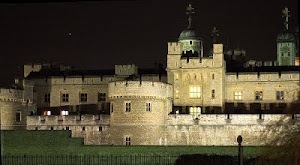


August 9, 2012
Regency Era author does Fantasy as well-Free short story
Way back, but not so far way back that you think that I am really old… (Well the big 50 is less than a month away) I wrote for the 1632  universe of Eric Flint, who way back (there’s a theme here) was one of the TA’s at UCLA while I was an undergraduate. We were both in the history department, and I could have had him as one of my TAs except I actually had a different TA for the course where I could have had Eric.
universe of Eric Flint, who way back (there’s a theme here) was one of the TA’s at UCLA while I was an undergraduate. We were both in the history department, and I could have had him as one of my TAs except I actually had a different TA for the course where I could have had Eric.
But that is beside the point. I suppose. If there is a point.
Eric though came up with a good, fun fantasy called 1632  which I have read many times.
which I have read many times.
There are even some good books that follow it. But there are some dross as well. One idea was to have many contribute to the universe that he created. I thought of a story idea, one that defines how they got into the stock market which becomes a big deal in their universe, and as this is right around the time of speculation in Tulips, apropos.
So I worked on that story, and I polished that story. I sent it to the submittal website and it was short listed for the first round of one of the books. The editors got it, and they lost it.
Back in the day, way back, you were supposed to give your editors the benefit of the doubt and not bug them. So I didn’t.
And I didn’t, and I didn’t. Well when editors keep track of things they don’t lose them, but these did, and then when I did bother them, they decided that the time line they were shepherding through the universe had already passed my tale by, though since it had gone up to the submittal site for all to read, ideas I developed were being used in other stories.
Today I decided to upload for all to read at the Space Opera Press 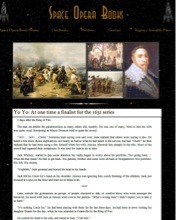 site.
site.
Please come and read Yo-Yo if you would like a peek at some writing from several years ago.


August 8, 2012
An Interview and new book coming soon
I have been interviewed once more. I am still plugging Jane Austen and Ghosts  . The feedback has been that those who have bought and read it, think it is a fun little romp. Just not many of you have taken the time to do so. I urge you to do so.
. The feedback has been that those who have bought and read it, think it is a fun little romp. Just not many of you have taken the time to do so. I urge you to do so.
I have been interviewed at  Sherry Jones website who found me through the English Historical Fiction Authors blog. Well worth your time to drop by. My next post there will go up on September 1.
Sherry Jones website who found me through the English Historical Fiction Authors blog. Well worth your time to drop by. My next post there will go up on September 1.
In line with that date, a big day for me, I am working on the final edits of a few books. Most recently, those who follow this blog will remember Two Peas in a Pod  . The story of brothers just back from the Napoleonic wars. Brothers who are identical and only a fine deduction can tell them apart. What tribulations they get into for they discovered long ago that they could exchange places with each other.
. The story of brothers just back from the Napoleonic wars. Brothers who are identical and only a fine deduction can tell them apart. What tribulations they get into for they discovered long ago that they could exchange places with each other.
What is very hard in this, is that the two Brothers are named Percival and Peregrine. Their sisters who are not twins, are named Priscilla and Penelope.
Something a gentleman wouldn’t, or at least shouldn’t do.
Here is an excerpt from the first chapter.
Chapter 1:It was a Close Run Thing
The Duke, he was that now, called and they went off to fight. At least that was the romantic way of thinking of things. “When father said that he would purchase commissions for us, I thought that we would do the normal thing. Parade about Town. Smile for the pretty girls. Chase actresses,” Percival Francis Michael Coldwell, the Earl of Kent said. He was a captain in the third battalion of the Grenadier Guards. It had been a terrible day. Hellacious was the word he was thinking, but if the rumors were true, the little corporal had fled again.
Major Peregrine Maxim Frederick Coldwell, the honourable, second in command of the second battalion of the Guards, looked at his older brother of seventeen minutes. He shook his head. Percy always complained about extra work. He did it, but if he could not complain about it, things were not right.
“And my lord, would you not have been bored beyond belief. I like that. It aliterates very well.” Peregrine scolded his brother. Percival would know it was a scold, since he had been called by a title and they were alone. They were the closest of brothers, not only as they were seventeen minutes apart in age, but in appearance, they looked exactly alike, though Percival had assured Peregrine that he weighed more. Peregrine noted that the way his brother had been eating and drinking, it was probably true.
“Should be much less bored chasing skirts and light o’loves then having some damn Frenchie try and skewer me, thank you very much. How many charges today? Do you really suppose it is true this time? That Bonney is finally defeated?” Percival asked. Peregrine knew his brother was upset by the day’s events. He was also. It was a difficult day, but then any day when their had been fighting had been difficult. Some damn near disastrous. Late last night when they had switched identities, again, had been to help calm the Earl’s nerves.
“I can appreciate a good woman and think that yes, we have finally sent the tyrant away for ever, now. Where is he going to get new men? France is bled dry. Hell even we are knocked up pretty badly. And them damn colonists in america are still fighting.” Peregrine said.
“I really don’t care about the americas. I pretty much care about me, and you a bit, well just so as I don’t have to write some dreadful letter to our sisters.” Percy smiled though to show that he was joking about that. He did care a bit about the Americas for their vast holdings had ownership in land there still, as well as the Caribbean. Percy was rich, and if the war was really over, he could resign his commission, though after today, they would call Captain Kent, for Peregrine was Major Coldwell, a hero. Even though it had been Peregrine who had been at the forefront of Percy’s company all day, repelling three regiments of Chasseurs. Everyone thought it was the Earl, while in the rear of the battalion, coordinating all of Colonel Askews commands and desires, everyone thought that Peregrine had done what was needful to ensure the Grenadiers fought excellently. It of course was not the case as they had changed position, and Percival had done his share and been in danger acting as Peregrine. Just not so foolish as to stand and exhort his men to bravery in front of them all as the enemy neared, or to lead charges and countercharges from the front. Madness is what it had been. But effective.
“Thank you my lord for your concern. I shall see what orders I may cut for the hero of the day and perhaps arrange for you to billet somewhere that a beauteous and impressionable farmers daughter might be will to accommodate our hero.” Peregrine smiled so his brother would know that he teased as well.
“Don’t you start. I think you have had a leg over just as many farmers daughters, and cit’s beauties as I have had this damnable war. Too few it is. Why the boys at Oxford would be damn disappointed in the both of us. No you need not go out of your way. Besides this hero nonsense, you best forget about it. I am sure Beaky knows all, though I am still mystified how he can tell us apart, damn few others can. And Askew. Askew knows for certain for he called my by name though where only he and I could be heard.”
That their commander knew was not so worrisome to Perry. The colonel knew that it was better to have a man of courage at the head of one of his companies, rather then have to worry about it. Peregrine did wonder how the man could tell, but perhaps it was because of the courage he displayed. Askew had remarked on it once before. Percy was just a tad more cautious then Peregrine. Something that was not a bad trait but noticeable in battle. Where you might not always want it to be. Cautious of course was a euphemism for fear. But not cowardice. The Guards had long ago gotten rid of the cowards amongst them. They were back in England, safe and enjoying life with barques of frailty.
“How does the Duke know about this?” Peregrine indicated the deception. They had done so several times, perhaps a dozen, since they had arrived on the continent. Mostly it was when one of them wanted a break. Especially Percival, for he did not like all the fawning and brown nosing that went with his being the Earl. Their father having died the last year they were at Oxford. Percival immediately bought a Captaincy and did not finish his schooling. Something that Peregrine knew would have upset their father.
Perry waited until he had finished his schooling and did use a portion of the funds his father had set aside to also purchase a Captaincy, not in the Guards, but no sooner had he been serving for six months, but a Majority had become available and he was asked to step-up and purchase it with a transfer. Being able to command his younger brother was something he could not resist and it gave them the opportunity to play their infamous pranks. Peregrine found it comforting to know he was doing well as a Major, was close to his brother, and had little worries, but now with the war ended, he had little idea what to do. Should he stay an officer? If the Duke had taken a dislike to their pranks, or any of the seniors, then that would spell an end to that line of reasoning.
Percival did not have to worry about such things. There was easily sixty thousand a year for him to spend, and Peregrine could not complain for Percival did give him some money as an income. He also would dower their youngest sister, Penelope, who was due to come out to society that christmas. She had been worst hit by their father’s death, for she was still at home in the schoolroom. Priscilla, the oldest of all of them, had been married the very year the old Earl had died. Now the Marchioness of Dorset, she was quite full of her own importance, at least the tone of her letters suggested it so.
“I don’t know how Beaky knows anything. But he does. He was riding by and called out to me, ‘Kent, come here.’ Though I know he has summoned you the same on occasion, he looked deep into my face, and we both knew that he was onto our prank. He leaned over. ‘As long as I have a Coldwell to my front, I am relieved,’ he said. He was talking about you of course. Knows I can make the men march, but should not like to do so when the bullets are flying. Neither does he of course, always riding everywhere.”
“He is the general of all. Of course he is riding everywhere. At least we weren’t at La Haye Sainte, should not like to have been there. Well if the Duke is upset, I shall hear of it shortly, I am sure. He has always been one to speak so. He mentioned the last full dinner that you were invited to, and I went in your place so you could sleep, that he quite understood your desire to not always traipse about as the Earl. We must have some trait that he can sniff out. Not many others can tell us apart.”
“Of course he can sniff it out. Damn big nose. What else is it good for.” Percival thought he was being funny. “Should think you said something when you went to that dinner and he knew.” It had been just a few weeks before and Percival had not wanted to be addressed as the Earl all night. Too much spanish coin, and others cutting a wheedle made him disgruntled.
Peregrine shook his head. “I assure you I did not. The Duke is just insightful. I would wish you to not call him by that name you do. I am sure you would not like to hear those you admire call you by a vile name. Besides, he has been quite good to us. Especially if he does know that we have been switching again.” Percival nodded in agreement.
“Hmm, did you know that you have some blood upon your arm there?”
“Yes, I was grazed but bound it up. It shall heal I am sure, and it is the arm. It will always be covered and no one will see the wound should my lord wish to exchange again in future.”
“Oh posh. I am concerned. You are my brother. Have you had a doctor look at it? There must be a damn one around here someplace.” Percival was struggling to rise. He had already had a half bottle of wine, Peregrine having the other half. It was a concession to another bloody day being over, and they both surviving. Earlier, while their mother remained alive, it was a worry that if one did not survive, what they would say to her. Now they had no attachments and their sisters, well those two chits would survive. Certainly Priscilla having married so well. Percival believed he was responsible for he thought he had thrown Priscilla in the way of Valéry Soames, the Marquis of Dorset. Soames was well off, though not as rich as the Kent’s. In land at least. Soames had more then enough money to meet his expenses of a year. That, Peregrine considered was all that a man need have to be rich. He thought of himself so.
Are you A RAPper or a RAPscallion?


August 7, 2012
A Regency Era Timeline 1800 (Finally)
As with the other timeline posts, there are so many graphics, and WordPress just doesn’t format tables very well, so I need to direct you to the website for this.
1800 however is now up with nearly 100 graphics.


August 5, 2012
A Regency Era Timeline 1800 without the Graphics (so still in progress) Preliminary and a Giveaway
Now that the Lexicon is finished for a time, I am back at work on the Timelines, which you can find house
And should you think that I have gone silent, such is not the case. I have now all of the entires for 1800 finished. I am in the process of adding graphics from my research and the internet. So for now I am giving you a glimpse of this:
Year
Month Day
Event
1800
Jan 7
Millard Fillmore, 13th US president (1850-1853), was born in Summerhill (Locke), N.Y.

1800
Jan 8
Victor of Aveyron (~1785-1828), a feral child, emerged from French forests on his own. In 1797 he had been found wandering the woods near Saint-Sernin-sur-Rance, France, and was captured, but soon escaped. He was later portrayed in the 1969 movie, The Wild Child (L’Enfant sauvage), by François Truffaut.

1800
Jan 10
The US Senate ratified a peace treaty with Tunis.
1800
Jan 20
Carolina, the sister of Napoleon I, married King Joachim Murat of Naples.
1800
Jan 23
Edward Rutledge (50), US attorney (signed Declaration of Independence), died.
1800
Jan 24
Edwin Chadwick, British social reformer, was born.
1800
Jan 30
US population was reported at 5,308,483; Black population 1,002,037 (18.9%).
1800
Jan
Pierre Samuel du Pont de Nemours, his two sons and their families, arrived in Newport, Rhode Island, from France.
1800
Jan
Lord Elgin established his British embassy in Constantinople. His orders were to open the borders for trade, obtain entry for British ships to the Black Sea and to secure an alliance against French military expeditions in the eastern Mediterranean.
1800
Feb 11
William Henry Fox Talbot (d.1877), British inventor and pioneer in instantaneous photography, was born.
1800
Mar 14
James Bogardus, US inventor, builder (made cast-iron buildings), was born.
1800
Mar 17
English warship Queen Charlotte caught fire and 700 people died.
1800
Mar 20
French army defeated Turks at Heliopolis, Turkey, and advanced to Cairo.
1800
Apr 2
1st performance of Ludwig van Beethoven’s 1st Symphony in C.
1800
Apr 15
Sir James Clark Ross, Scottish explorer, was born. He located the Magnetic North Pole.
1800
Apr 16
George Charles Bingham, British soldier, was born. He commanded the Light Brigade during its famous charge.
1800
Apr 24
US Congress approved a bill establishing the Library of Congress in Washington, D.C. with a $5,000 allocation.
1800
April
April: Beethoven premiers his Symphony No. 1 in C major in Vienna.
1800
April
April: English poet William Cowper dies at age 68 .
1800
May 5
Louis Hachette, French publisher (Librairie Hachette), was born.
1800
May 7
US Congress divided the Northwest Territory into two parts, and Indiana, the latter out of the western portion, including Illinois, Wisconsin, Indiana and parts of Michigan and Minnesota. The provisions of the Treaty of Paris (1783) which ended the Revolutionary War, had defined the borders of the US. Among other concessions, Great Britain agreed to a line through the Great Lakes that placed in US control the territory called the Old Northwest, between the Ohio and Mississippi rivers. States that had previously laid claim to parts of the region ceded their territories in anticipation of the Northwest Ordinance of 1787.
1800
May 7
Niccolo Piccinni (72), Italian composer (Roland), died in Paris. Gluck’s rival
1800
May 9
John Brown, American abolitionist, was born. His adventures came to an end at Harper’s Ferry, where he tried to start a revolution against slavery.
1800
May 14
Friedrich von Schiller’s “Macbeth,” premiered in Weimar
1800
May 15
King George III survived a 2nd assassination attempt.
1800
May 19
French Bosbeeck, veterinarian, robber, was hanged.
1800
May
May: “The Masquerade given at the King’s Theatre, on the 1st instant, was numerously attended. Among the several characters, a Quack Doctor was most conspicuous – a Sylvester Daggerwood who had an infinite deal of nothing to say — Sailors, Countrymen, Chimney Sweepers, Flower Girls, Gipsies, a Tommy Tonsor, a band of Mrs. Montagu’s friends, a Rolla, who tore his fine speeches, full of logic and grammar, and a great number of Harlequins and Clowns, the former sans agility, the latter sans humor, filled up the scene. The supper was the best by far that has of late been given upon such an occasion, and the company was truly respectable. We cannot conclude this brief account without expressing our disapprobation of the indecent custom of men habiting themselves like women. The conduct of some persons of this description, during the evening, disgusted the greater part of the assembly; but at length some gentlemen, much to their credit, actually compelled them to retire from the merry scene.”- The Sporting Magazine
1800
May
May: An assassination attempt is made on George III at Drury Lane Theatre.
1800
May
May: Napoleon crosses the Alps and invades Italy.
1800
May-Dec
US presidential elections were held over this period. On Dec 3 state electors met and cast their ballots and a tie resulted between Thomas Jefferson and Aaron Burr.
1800
Jun 4
The US White House was completed and President & Mrs. John Adams moved in. [see Nov 1]
1800
Jun 14
French General Napoleon Bonaparte pushed the forces of Austria out of Italy in the Battle of Marengo. In 2007 the sword he wore was auctioned off for over $6.4 million.
1800
Jun 14
Jean-Baptiste Kleber (47), French general, architect, was murdered.
1800
June
June: Napoleon drives the Austrians from Italy (which they had conquered while he was busy in Egypt) in the Battle of Marengo.
1800
June
The new city of Washington in the District of Columbia became the US capital, succeeding Philadelphia. This occurred when government departments began to move into their new buildings on land ceded to the federal government by Maryland and Virginia. The radial design of the city was created by the French architect Pierre Charles L’Enfant. Construction had begun in 1791 but was delayed following L’Enfant’s dismissal in 1792. The first Congress to sit in Washington convened on Nov. 17, 1800. The first president to live in the executive mansion, John Adams moved in also in November. The first president to be inaugurated there, Thomas Jefferson was sworn into office March 4 1801. The US was the first modern nation to design a city exclusively as a capital. Free inhabitants 2,464, slaves 623.
1800
Jul 6
The Sultan of Constantinople at the behest of Lord Elgin issued written orders to his officers in Athens for cooperation with Giovanni Lusieri and the removal of sculptures from the Parthenon.
1800
Jul 8
Dr. Benjamin Waterhouse gave the 1st cowpox vaccination to his son to prevent smallpox. [see May 14, 1796]
1800
Aug 21
The US Marine Band gave its first concert near the future site of the Lincoln Memorial.
1800
Sep 6
Catherine Esther Beecher, educator who promoted higher education for women, was born in East Hampton, Long Island, NY.
1800
Sep 7
The NYC Zion AME Church was dedicated.
1800
Sep 23
William Holmes McGuffey, educator, was born. He is famous for his book “Eclectic Readers” (McGuffey Readers).
1800
September
September: At the invitation of the Maltese, British troops liberate the Islands of Malta and Gozo from the French.
1800
September
Cayuga Bridge, an engineering marvel of its time, was completed. It crossed the northern end of Cayuga Lake and the Montezuma Swamp in west central New York. The bridge, one and one-eighth of a mile long, was built of wood and was wide enough for wagons to pass abreast. Stages of the Genesee Turnpike used it, as did American troops in the War of 1812 on their way to the Niagara frontier. The bridge cot $150,000. It was financed by a loan from the Manhattan Company of New York City, which was founded in 1799 by Aaron Burr. Ostensibly established as a water supply company, the Manhattan Company had a charter broad enough so that it could function as a bank.
1800
Oct 1
Spain ceded Louisiana to France in a secret treaty.
1800
Oct 2
Nat Turner, slave and the property of Benjamin Turner, was born in Southampton county, Va. He was sold in 1831 to Joseph Travis from Jerusalem, Southampton county, Va.
1800
Oct 3
George Bancroft, historian, known as the “Father of American History” for his 10-volume A History of the United States, was born.
1800
Oct 7
Gabriel, slave revolt leader in Virginia, was hanged. Gabriel Prosser had mounted a slave rebellion.
1800
Oct 25
Thomas Babington Macaulay (d.1859), England, poet and historian, was born. “No particular man is necessary to the state. We may depend on it that, if we provide the country with popular institutions, those institutions will provide it with great men.”
1800
Oct 26
Helmuth Karl von Moltke, Prussian Field Marshal and Count, was born. His reorganization of the Prussian Army led to military victories that allowed the unification of Germany. His father was a German officer serving in the Danish army. His greatest innovation was the creation of a fighting force that could mobilize quickly and strike when and where it chose. He was one of the first generals to grasp the importance of railroads in moving troops. In 1995 Otto Friedrich authored a biography of the Moltke family line from Bismarck to Hitler: “Blood and Iron: From Bismarck to Hitler the von Moltke Family’s Impact on German History.”
1800
Nov 1
John and Abigail Adams moved into “the President’s House” in Washington DC. It became known as the White House during the Roosevelt administration.
1800
Nov 17
The Sixth Congress (2nd session) convened for the first time in Washington, DC, in the partially completed Capitol building. Previously, the federal capital had briefly been in other cities, including New York, Philadelphia, and Annapolis, Maryland. George Washington- a surveyor by profession- had been assigned to find a site for a capital city somewhere along the upper Potomac River, which flows between Maryland and Virginia. Apparently expecting to become president, Washington sited the capital at the southernmost possible point, the closest commute from Mount Vernon, despite the fact that this placed the city in a swamp called Foggy Bottom.
1800
Nov 24
Carl Maria Ernst von Weber’s (1786-1826) opera “Das Waldmadchen,” was written in Freiburg.
1800
Dec 2
John Brown (d.1859), US abolitionist, was born. He was hanged for murder in the Harper’s Ferry Incident in 1859. John Brown led the raid on the Federal Arsenal at Harper’s Ferry. The incident is the backdrop for George MacDonald Fraser’s novel “Flashman and the Angel of the Lord.”
1800
Dec 3
Austrians were defeated by the French at the Battle of Hohenlinden, near Munich.
1800
Dec 3
US state electors met and cast their ballots for the presidency. A tie resulted between Thomas Jefferson and Aaron Burr.
1800
Dec 12
Washington DC was established as the capital of US.
1800
Dec 29
Charles Goodyear (d.1860), inventor of vulcanized rubber for tires, was born.
1800
Dec
In Virginia Martha Washington set all her slaves free.
1800
December
December: Peace negotiations between France and Austria break down, and Napoleon sends General Moreau into Austria, where he is victorious at the Battle of Hohenlinden.
1800
December
December: Washington, DC is officially established as the capital of the United States.
1800
A new edition of Lyrical Ballads is published, with a Preface by William Wordsworth (expanded in the 1802 edition) that stands as a Romantic manifesto on the nature of poetry.
1800
Jacques Louis David paints his famous Portrait of Mme. Récamier.
1800
London’s Royal College of Surgeons is founded.
1800
Maria Edgeworth’s Castle Rackrent is published.
1800
In a secret treaty with Spain, the Treaty of San Ildefonso, France regains Louisiana.
1800
England’s population, around 5.25 million in 1720, has increased to around 9 million. World population has risen from between 600 and 680 million in 1700 to one billion, roughly calculated. The most populous cities in 1800 are: Guangzhou, China: 1.5 million. Hangchow, China: 1,000,000 Kingtehchen, China: 1,000,000 NanJing, China: 1,000,000 Edo (Tokyo), Japan 1,000,000 London, England: 865,000 Beijing, China: 700,000 Constantinople (Istanbul), Turkey: 598,000 Paris, France: 548,000 Kyoto, Japan:530,000
1800
Mexico City has a population of 250,000. New York City: 60,000. Population remains sparse in areas occupied by hunter-gatherers — in Africa and the plains of North America. Areas occupied by pastoral nomads are also sparse.
1800
In the US presidential elections Thomas Jefferson and Aaron Burr tied in electoral votes. The selection was then moved to the House of Representatives where on the 36th ballot Vermont and Maryland switch their votes to Jefferson. [see Feb 17, 1801]
1800
France Presern (d.1849), author, painter, poet, musician, mathematician and architect, was born in Slovenia. His image was later featured on Slovenia’s 1,000-tolar bills.
1800
Johann Christian Reinhart, German artist, created his work: “The History Painter, Caricature.”
1800
Friedrich Schiller wrote his drama “Mary Stuart.” The play is compressed into the last 3 days of Mary’s life.
1800
Rev. Mason L. Weems (d.1825) authored the biography “Life of Washington.”
1800
Father Demetrius Gallitzin (1770-1840), a Russian-born Catholic priest, was directed by bishop John Carroll to investigate spirits in the home (Wizard’s Clip) of Adam Livingstone in the Shenandoah Valley.
1800
Congress allocated a room in the Capitol for the US Supreme Court.
1800
The American political “revolution” brought the Republicans to office in the (sic) first peaceful transition of power between rival political parties in human history.
1800
Worcestershire sauce was a ketchup and came out about this time.
1800
Jean Baptiste Pointe du Sable, a pioneer trader and founder of the village that became Chicago, sold his holdings and moved to a Missouri farm.
1800
The population of the world doubled from what it was in 1500 to more than 800 million. The world’s population reached about 1 billion about this time. In 1927 it reached 2 billion; in 1959 3 billion; in 1987 5 billion; in 1999 6 billion and in 2011 7 billion.
1800
William Herschel (1738-1822), German-born English astronomer, detected what later became known as infra-red red light in experiments with glass prisms and thermometers. Infrared solar rays.
1800
Alessandro Volta (1745-1827), Italian physicist, first demonstrated the electric pile or battery. Invents the electric cell.
1800
Robert Fulton (35) tested a 20-foot model of his torpedo-armed submarine on the Seine. He made two 20-minute dives himself.
1800
John Chapman (1774-1845), Johnny Appleseed, a Swedenborgian missionary, a land speculator, a heavy drinker and an eccentric dresser, began planting orchards across western Pennsylvania, Ohio, and Indiana from seed. (T&L, 10/1980, p.42) )(AHD, p.225)(HNQ, 1/2/01)
1800
Lieven Bauwens stole a spinning “mule jenny” machine from Britain. He had it dismantled and smuggled out in a cargo of coffee. This enabled the textile industry in Ghent, Belgium, to greatly expand. Britain sentenced Bauwens to death in absentia and Ghent made him a hero.
1800
Mary Robinson (42/43), writer, actress, courtesan and fashion icon, died. In 2005 Sarah Gristwood authored “Perdita: Royal Mistress, Writer and Romantic.” Paula Byrne authored Perdita: The Literary, Theatrical, Scandalous Life of Mary Robinson.”
1800
The Parliament in Westminster passed an Act of Union formally binding Ireland with England and abolished the Irish parliament. The Act of Union entailed the loss of legislative independence of the Irish Parliament.
1800
The French regained the territory of Louisiana from Spain by the secret Treaty of Ildefenso.
1800
Dessalines, a lieutenant of Haitian rebel leader Toussaint L’Ouverture (Louverture), butchered many mulattoes (the estimates range from 200 to 10,000).
1800
The Althing of Iceland was abolished by the Danish king.
1800
About this time an Arab nomadic tribe settled in the southern Israeli desert of Negev. The Al-Sayyid community that developed there grew with a high incidence of profound deafness due to a recessive gene. The village developed a sign language in response that came to be called the Al-Sayyid Bedouin Sign Language (ABSL). In 2007 Margalit Fox authored “Signs and Wonders,” which told the Al-Sayyid story as part of a history of linguistics and sign language in American and the world.
1800
Ito Jakuchu (b.1716), Japanese painter based in Kyoto, died.
1800
In Sweden Count Balthazar Von Platen started the Gut Canal.
1800
Many Bantu people from Malawi, Mozambique and Tanzania were taken from their homes and sold as slaves in Somalia.
1800
In Germany Hymnen and Die Nacht by the poetFriedrich Leopold von Hardenberg, called Novalis (1772-1801). Probably the most romantic of all the Romantics, he symbolized their yearnings as the ‘blue flower.’ This poem expressed another German Romantic idea, the death wish.
1800
John Gilchrist in India, principal of the newly-founded college at Fort William, compiled the first Urdu grammar and dictionary. This made possible translation of foreign literature into Urdu.
1800
Coelina, ou L’Enfant de Mystere by Rene Charles Guilbert de Pixerecourt (1773-1844). He was the first writer to use the word ‘melodrama’ on its modern sense, in his manifesto Le Melodrama. Hw claimed to write for those who could not read, and his plays call for spectacular effects. His work was widely translated.
1800
The government of Burma laid down rules controlling the theatre, to ensure that live and puppet performances were respectful to the King and the Buddhist religion. In fact the theatre became a political force; a noted play, Wizaya by U Pon Nya, was written to incite support for a usurper.
1800
In Wales the revival of National Eisteddfod
1800
The Aeolodion, a keyed wind instrument, is said to have been invented by J.T. Eschenbach of Hamburg. It was subsequently modified by various other mechanicians and eventually superseded by the harmonium.
1800
Birth of Mikha’il ibn Jurjis al-lubnani Mushaqa in Arabia. Musical theorist and writer (d.1888), the most important modern Arabic writer on theory of music.
1800
Joseph Marie Jacquard invented a punch card loom.
1800
French silversmiths arriving after the French Revolution in Canada settled in Quebec which became an important centre of silversmithing: unlike the earlier Huguenot immigrants to America, they were Catholic and most of their work was ecclesiastical.
1800
Figurines in pottery were made at Radonezh, Russia, Viatka and Okhta: those from the last two centres were comedy and caricature figures.
1800
Life size statue group, the Twelve Prophets by Antonio Francisco Lisboa (1738-1814) in Brazil. Sculptor and architect he worked in rococo style and despite paralysis, was considered the most important sculptor in colonial Brazil.
1800
Magic lanterns were equipped with limelights in Europe Cylinders of lime heated by an oxyhydrogen flame.
1800
John Crome (1768-1821) painted his more important large pictures. He and Cotman were considered the major artists of the Norwich school of landscape painting. His pictures of Slade Quarries, Moonrise on the Marshes of Yare, Mousehold Heath and Poringland Oak showed a feeling for the spirit of place which foreshadowed he Romantics.
1800
Beginning of Josiah Spode II’s period of Spode’s Stoke-on-Trent porcelain factory; he finally formulated the bone china recipe (hard-paste porcelain modified by the addition of bone-ash)
1800
Development of gold, silver and copper lustre ware pottery in England
1800
Napoleon establishes himself as First Consul in the Tuileries
1800
French army defeats Austrians at Biberach and Hochstadt.
1800
French army advances on Vienna
1800
Napoleon’s army crosses the Great St. Bernard Pass
1800
British conquer Malta
1800
A plot to assassinate Napoleon discovered in Paris
1800
Thomas Morton: “Speed the Plough,” comedy in which for the first time a reference to the character Mrs. Grundy appears
1800
Jean Paul: “Titan,” a german novel
1800
Mme. de Stael: “On Literature”
1800
Napoleon appoints committee of jurists to draw up Civil Code
1800
Goya: “Portrait of a woman”
1800
Cardinal Barnaba Chiaramonti elected Pope Pius VII (-1823)
1800
Fichte: “Der geschlossene Handelsstant”
1800
Arnold Heeren: “European Political Systems”
1800
Schelling; “System des transzendentalen Idealismus”
1800
Church of United Brethern in Christ founded in the US
1800
Boieldieu: “Le Calife de Baagdad,” opera, Paris
1800
Cherubini: (“The Water Carrier”), opera, Paris
1800
Humphry Davy: “Researches, Chemical and Philosophical, Concerning Nitrous Oxide”
1800
German physician F.J. Hall (1758-1828) founds practice of phrenology
1800
Richard Trevithick constructs light pressure steam engine
1800
Eli Whitney makes muskets with interchangeable parts
1800
Grossglockner, in the Austrian Alps, first successfully scaled
1800
Letter post introduced in Berlin
1800
Ottawa founded
1800
Bill Richmond (1763-1829) a former Negro slave, becomes one of the first popular boxers
1800-1861
This period was covered by Nicholas E. Tawa in his 2000 book: “High-Minded and Low-Down: Music in the Lives of Americans, 1800-1861.”
1800-1900
Charles M. Russell, 19th century American landscape painter. In 2001 his painting “A Disputed Trail” sold for $2.4 million.
1800-1900
In the 1990s Claude Rawson wrote Vol. 4 of “The Cambridge History of Literary Criticism: The Eighteenth Century.”
1800-1900
In California floods turned the Central Valley into a lake 700 miles long.
1800-1900
Sir David Brewster, 19th cent. Scottish scientist, inventor of the kaleidoscope.
1800-1900
J.H. Salisbury was a 19th century English dietician who recommended a diet of ground steak for a variety of ailments including pernicious anemia, tuberculosis and hardening of the arteries. His name gave rise to “Salisbury steak.”
1800-1900
19th century Tokyo was called Edo and served as the shogun’s power seat.
1800-1900
In what later became Pakistan feudal families came to power when the British made weak vassals into a hereditary land-owning elite loyal to London.
1800-1900
In South Africa the Witwatersrand gold mines were discovered, the largest gold reserve find in the world. The gold came from a strip of land 62 miles long and 25 miles wide and produced three-fourths of all the gold ever mined.
1800-1900
The main river channel at Hoi An, Vietnam, shifted toward Danang and made navigation by deep-draft ships difficult, and thus lost its commercial importance. A new port was built on the Han River at Da Nang.
We also have our Giveaway taking place:
For the Giveaway, see our original blog post from Saturday
I finished the Lexicon for this go round, (Found a list of Nautical terms from the period buried in my files to add for the next go round) so time for a little celebration.
For those who missed it, there are a lot of previous posts here of all the letters and you can skip back and have a look.
For this post and running through the week, the winner to be picked on Monday the 5th, I will be giving away a free eBook copy of Jane Austen and Ghosts
In the world of moviemaking, nothing is as golden as rebooting a classic tale that has made fortunes every time before when it has been adapted for the silver screen. Certainly any work by Jane Austen made into a movie will not only be bankable, but also considered a work of art.
That is of course until the current wave of adaptations that unite her classic stories with all the elements of the afterlife is attempted to be created. That these have found success in the marketplace amongst booklovers may not be quite understood by those who make movies. But that they are a success is understood and a reason to make them into movies.
All that being said, perhaps it would also be fair to say that the very proper Jane, were she present to have anything to say about it, would not be pleased. Of course she has been away from this Earth for nearly 200 hundred years. But does that mean were she upset enough, she wouldn’t come back?
But to enter the contest I should like 2 things. As Jane deals with old B Horror Movie legends in Jane Austen and Ghosts, I would like you to put in the comments section here:
1) The name of a B movie legend (and please let us try not to repeat since it will be fun to see how many we can come up with. So to start off, I will give one as an example, Boris Karloff)
2) One favorite word from the Lexicon which you can see each separate letter here in the Blog by looking at the previous days posts, or go to the entire lexicon at the Regency Assembly Press website, here (Regency Lexicon)
3) (Optional) Your name of course (if you are registered and signed into WordPress then I can click back to you if you are the winner, but if you are not,) and an email or some way to get you the prize!
4) (Optional) And if you are super proactive, what eBook format you would need should you be our winner!



